Travel to Ethiopia: Everything you need to know
By Joan Torres 30 Comments Last updated on April 25, 2024

From visiting the most epic Christian sites to meeting ancient tribes with animistic beliefs, and from roaming around the thickest jungle to crossing the most inhospitable desert; traveling in Ethiopia is the most diverse African experience and this travel guide contains everything you need to know about it
I seriously thought that Ethiopia was a touristic, well-known country in the West but, when I came back from my trip, I was surprised to find out that many people had absolutely no clue about it, like they didn’t even know about its geographical location.
The truth is that traveling can be extremely subjective and, while Ethiopia may be a relatively touristic country as per Against the Compass standards – meaning that this is one of the most visited countries I talk about in this blog – compared to other average destinations, it is a real off the beaten track destination.
Little is known about this African country and, when people ask me what it is like to travel in Ethiopia, I always begin the conversation with the following:
The main reason to visit Ethiopia is that it is an exceptionally diverse experience.
On the one hand, the cultural diversity is huge. In Ethiopia alone, you have 80 distinct ethnic groups who speak more than 80 languages and practice different religions, from different branches of Christianity to Islam and animistic beliefs.
On the other hand, this is a historically rich country and the one with the most impressive historical and archeological sites in sub-Saharan Africa, once the capital of the Aksumite Empire – one of the most powerful ancient empires in the continent that ruled for more than 800 years – and home to endless jaw-dropping millennial rock-hewn churches and European-like medieval castles.
Furthermore, contrary to any Western cliché, Ethiopia is also a land of natural contrasts, composed of fertile tropical forests in the south and vast flat deserts in the east, the Danakil Depression being home to lava pools and the hottest settlement in the world. In the north, Lake Tana is the source of the Blue Nile and Simien Mountains is one of the very few places in Africa with regular snowfall, the highest peak being at 4500m.
And by the way, the scenery in Ethiopia is unconditionally hair-raising, a real blessing to your eyeballs.
And if that wasn’t enough, Ethiopia was recently rebranded the Land of Origins by the Ministry of Tourism because these lands are the origin of humankind – where the oldest hominid was found – the first place to ever produce coffee and they practice one of the rawest and most ancient ways of Christianity.
Trust me, after traveling to so many countries, I am rarely impressed but still, Ethiopia definitely wowed me.
This guide contains everything you need to know to travel to Ethiopia (literally, everything), from how to get a visa to getting in, top experiences, cultural facts, budget and loads of personal travel tips.


In this Ethiopia travel guide you will find:
Table of Contents
- Overlanding
- Best time to visit
- Travel insurance
- Top experiences
- Books on Ethiopia
- Cultural facts
- The country
- People & Language
- Money, budget & costs
- Is it safe?
- Solo female travel
- Moving around
- Where to stay
our recommended travel insurance for Ethiopia
With its Backpacker plan, IATI Insurance is the best insurance for any kind of adventurous destination, like Ethiopia.

🪪 How to get a visa for Ethiopia
How to get an e-visa for ethiopia.
Everybody needs a visa for Ethiopia but today, pretty much any nationality can get a tourist e-visa.
And you can easily apply through the official website .
Make sure you do it through the above URL because there are many non-official websites which, even though they do issue valid visas, charge much more money.
Typically, there are 2 types of tourist e-visa:
- 30-day visa, which costs 82USD
- 90-day visa, which costs 102USD
And it takes up to 3 days to process. Mine took less than 24 hours.
It’s a very easy process which has absolutely no secret and very little requirements.

Is the Ethiopian e-visa valid at land borders?
Officially, the tourist e-visa is only valid for those entering via Bole International Airport in Addis Ababa .
My trip to Ethiopia was part of a 3-month journey through the Horn of Africa, traveling from Eritrea to Djibouti, Soma liland and then entering Ethiopia overland, so I intended to apply for it at the embassy in Djibouti.
However, once I got there, they told me that they had run out of visa stickers and that they would not receive more after a couple of weeks at least.
Then, I tried my luck in Hargeisa, the capital of Somaliland but, unfortunately they weren’t issuing visas anymore, so I was in a situation in which, according to the official information, the only thing I could do was booking a flight from Hargeisa to Addis Ababa, which kind of sucked.
However, I contacted a few travelers who said that in Africa, anything can happen and proof of that is that they managed to travel to Ethiopia overland with an e-visa, so I decided to try my luck as well and successfully managed to cross the border from Somaliland , no questions asked.
Visa on arrival for Ethiopia
If you don’t have time to apply for an e-visa because your flight to Addis Ababa is less than 3 days ahead, you can also get a VOA at Bole International Airport.
Otherwise, I don’t see any good reason why you should get a VOA instead of an e-visa.
How to apply for an Ethiopian tourist visa via embassy
The only reason for applying for your Ethiopia tourist visa at the embassy is because you are entering overland and don’t want to risk a potential denial because you are only in possession of an e-visa.
You can find Ethiopian embassies and consulates in many cities across Europe and North America. Just contact your nearest one to ask about the process, which tends to be very easy.
🛫 How to get to Ethiopia
How to travel to ethiopia by plane.
Bole International Airport in Addis Ababa is one of the most transited airports in the African continent.
I had actually been there twice even before visiting Ethiopia, as Addis Ababa is a common stop for many flights going to other African destinations and the Middle East .
The main airline operating in the country is Ethiopian Airlines , a modern company that flies all over the world , including to and from the American continent.
Moreover, there are many other international airlines that fly to Addis. I actually flew out of the country with Emirates.
Remember that, if you fly in with Ethiopian Airlines, you get a 50% discount on all domestic flights . Check the how to move around section of this post for more information.
How to travel to Ethiopia overland
Ethiopia shares a border with so many countries :
Traveling to Ethiopia from Sudan
Completely open to foreigners. There are regular minivans running from a Sudanese city named Qadarif to the border, and the border formalities are not very complicated.
Read my Sudan travel guide.
Traveling to Ethiopia from Djibouti
An easy border to cross from a bureaucratic point of view but difficult from a logistic point of view, as you need to cross the desert on a 4×4.
Moreover, an easier option would be taking the train that goes from Addis to Djibouti City, but it is a bit unreliable. For more information, check the moving around section.
Traveling to Ethiopia from Kenya
Crossing from the Kenyan town named Moyale should be a simple process.
Traveling to Ethiopia from South Sudan
Not possible. You would have to go through the jungle and go across the most dangerous part of South Sudan, so forget it. There are daily flights connecting both countries though.
Traveling to Ethiopia from Eritrea
This border is closed for foreigners and more often than not, also for locals. The only way of traveling between both countries is by flying in, from Asmara to Addis.
Read my Eritrea travel guide .
Traveling to Ethiopia from Somalia
The one I used. As you may know (or not), Somalia is divided into two regions, actual Somalia and Somaliland.
You can travel to Ethiopia from Somaliland, using the border near the city of Harar. It was very easy and quick to cross. There are normal roads and plenty of public transportation.
Read my Somaliland travel guide

⛅ Best time to visit Ethiopia
Ethiopia is a big country composed of several geographical regions, each having a different optimal season to visit, so it’s a bit difficult to guess the ideal time to come.
Rainy season
Typically, most travelers avoid the rainy season running from mid-June to mid-September, especially because the northern highlands is where it rains the most, the region with the highest concentration of popular destinations, including Gonder, Axum, Tigray churches, Simien Mountains and Lalibela .
In the south, however, which includes the famous Omo Valley , the rainy season runs from March to June, and it’s highly advisable to avoid these months, for the simple reason that the remotest villages, which are only accessible along muddy roads, will be unreachable.

November to January is high season
The weather is ideal and, up to January, the landscapes are beautifully green still. Expect to find big crowds and high prices though.
February and March is a good time too
As the weather is pleasant and most crowds are gone but the main downside is that it is already dry season, so the northern landscapes won’t be as pretty. I visited Ethiopia from February 1st to mid-March.

Therefore, in order to avoid the crowds and still get pretty landscapes, I believe that mid-September and October would be the best time to go backpacking in Ethiopia.
However, bear in mind that the Danakil Depression , one of the country’s highlights, is also one of the hottest places on Earth, and September and October’s heat will be unbearable; it is advised to visit here from mid-November to February.
And last, you may also want to organize your visit so you come during one of their most important cultural festivals :
- Genna – Ethiopian Christmas that takes places on January 7th
- Timkat – Ethiopia’s Orthodox Christian celebration that takes place on January 20th
- Meskel – Ethiopian religious holiday that takes places at the end of September
As you can see, telling you the right time is a bit tricky!

🚑 Travel insurance for Ethiopia
Ethiopia is an adventurous region, so make sure to choose a proper backpacking insurance with good adventure coverage. I recommend IATI Insurance .
- It covers the largest number of adventure activities, including trekking
- Covers both short-term trips and 1-year long trips.
- Covers senior citizens too.
- Readers of this blog get an exclusive 5% discount

🛖 Top experiences in your trip to Ethiopia
Trekking among tens of thousands of baboons.
A rugged, mountain range composed of insanely vertiginous cliffs and several peaks above 4000 meters and inhabited by, literally, thousands and thousands of an endemic species of baboon, trekking the Simien Mountains is one of the highlights of any trip to Ethiopia.
Read my experience trekking in the Simien Mountains of Ethiopia

Visiting the hottest (inhabited) place on Earth
Danakil is a vast depression popularly known for being one of the most inhospitable places on Earth, an arid, unwelcoming land filled with volcanoes and insane geological formations, colors and absolutely crazy landscapes, inhabited by a distinct ethnic group named Afar.
Read my experience visiting the Danakil Depression

Exploring ancient churches built over cliffs
Ethiopia was one of the first countries to adopt Christianity and its churches are not only some of the most ancient churches in the world, but they have been carved out from rocks located in the most unbelievable and vertiginous locations, and what is even more incredible is that they are still as functional as they used to be 1200 years ago.

Feeding wild hyenas with your mouth
In the eastern city of Harar, there is a man who has dedicated every day of his life to feeding hyenas. Those hyenas aren’t domestic but they are free, live in the wild and everyday, at around 6-7pm, a bunch of them come nearby his house to get feed some fresh, raw meet. It is possible to assist the peculiar ceremony and feed them with your own mouth.

Assisting an actual bull-jumping ceremony
A traditional ceremony celebrated by the Hamar tribe (one of the many tribes in the Omo Valley) in which a young boy jumps naked over 10 bulls in order to prove that he is ready to be married.
Before the actual ceremony, there is a party in which people from all the nearby settlements gather to drink, dance and do some other cultural stuff.
Read my experience visiting the Omo Valley on a budget

📚 Best books for planning your trip to Ethiopia
If you don’t have one yet, remember to get a Kindle for your journey, so you don’t have to carry along all your books! CLICK HERE TO GET YOURS
Ethiopia travel guide by Bradt
This is the Ethiopian Bible, definitely, the best book guide available for Ethiopia, and probably, the most complete book Bradt has ever written. A complete travel guide filled with endless insights, cultural facts and history. A must-have.

Ethiopia travel guide by Lonely Planet
It is not as complete as Bradt’s but it’s not that bad, it’s easier to read and they have a special chapter dedicated to the tiny, neighboring country of Djibouti.

🕌 Facts about the country, the people and religion
10 facts about ethiopia as a country.
1 – The Federal Democratic Republic of Ethiopia – It is a landlocked country in the Horn of Africa, one of the largest countries in the continent and with a population of 108,000,000.
2 – The capital of Ethiopia – The capital is Addis Ababa, often referred as the political capital of Africa, as this is the African Union Headquarters and has a strong political and diplomatic influence in all the continent.
3 – It’s a very poor country as per Western Standards – Nearly 50% of their total GDP is based on agriculture, mainly coffee. It is however, one of the most powerful and influential countries in Africa. A curious fact is that I met many Somalis from Somaliland and Eritreans whose short-term objective was migrating to Ethiopia and getting an Ethiopian passport, which is apparently better than other African passports.
4 – It’s never been colonized – Italy tried to take it over twice, at the end of the 19th century and in 1936, but they were defeated so, along with Liberia, Ethiopia is the only African country which has never been colonized, one of the reasons why it is so unique and barely has any foreign influence.
5 – Ethiopia has close ties with Eritrea – Neighboring Eritrea is Ethiopia’s little brother, a country with practically the same culture. They have the same food, religion and share a big bunch of ethnic groups. The dominant ethnic group in Eritrea are the Tigrinya, which also turn out to be one of the most influential groups also in Ethiopia, inhabiting the Tigray region, the most touristic destination in Ethiopia. Moreover, they used to be the same country until 1991. For more information, read my Eritrea travel guide .

6 – They are 6 hours ahead of anyone – The funniest fact about Ethiopia is that their time is different than ours, but they are 6 hours ahead. This means that if someone from Ethiopia tells you to meet at 18h, you need to be there at 12h. Well-educated people from Addis Ababa will talk to you in rest-of-the-world-time, so will those in the countryside who are used to dealing with tourists. But the rest of the country will not and, more often than not, if you ask them: are you talking in Ethiopian time, or faranji time? they will not know what you are talking about. You are likely to meet many travelers who missed a certain bus because of this particular fact.
7 – Ethiopia is the origin of mankind – Lucy , the oldest and most complete hominid ever discovered, dating back from more than 3 million years ago, was found in Ethiopia, in the Afar Depression.
8 – Ethiopia is an ethnic Federal state – Given the ethnic complexity, in 1994, Ethiopia was divided into 9 separate autonomous regions, each one ruled by one of the largest and most influential ethnic groups.
9 – Ethiopia was once one of the most powerful Empires – The Aksumite Empire, whose center was in today’s Tigray region and Eritrea and which ruled from 80BC to 825AD, was one of the most important empires in the Ancient World, along with Rome, Persia, and China.
10 – This is former Abyssinia – A few hundred years after the fall of the Aksumite Empire, there was a man who claimed to be a direct descendent from the last Aksumite King and managed to establish a feudalist state that lasted until 1974, when the famous Emperor Haile Selassie was overthrown and modern Ethiopia started to develop.

9 Facts about Ethiopians and their language
1 – There are two types of Ethiopian – On the one hand, you meet lovely, kind-hearted people who are always willing to help, or simply have a chat with you. And on the other hand, there are the people who try to rip you off continuously. During your Ethiopian trip, you will be meeting both types all the time and, by experience, you will be able to differentiate them easily.
(But most people are good 😉 )
Faranji , hey you, you you, faranji , you! Something I found extremely irritating (and most travelers do as well) is that, when you get into a new city or place, many people will start yelling: hey you, faranji, faranji, come here, come here! This also can happen with people you bump into in the street. In response, something very funny you can do is looking at them and say: hey you, habesha, habesha, come here, come here! Habesha means local , or Ethiopian , so you are basically telling them the same thing. Because they don’t expect such a reply from a faranji , in most occasions they will freeze, while others will laugh and probably shake your hand, turning an annoying person into a pleasant one.
2 – There are 80 distinct ethnic groups – The major groups being Oromo, Amhara, Tigray, Sidamo and Somali, which make up nearly 80% of the total population.

3 – The rest of the groups are minorities – And 45 of them live in a region named Southern Nations, Nationalities and People’s region, the vast majority being tribal people.

4 – Amharic is the official language – The lingua franca, the one used by the Government and the one used by the dominant ethnic group, the Amhara people, is Amharic.
5 – It comes from Ge’ez – Which is the language spoken in Ancient Axum and is still used today by the Ethiopian Orthodox Church.
6 – The alphabet is so cool – It’s called a syllable alphabet.
7 – But more than 80 languages are spoken – Or 70, depending on the source. Each ethnic group has a distinct language.
8 – And not everybody speaks Amharic – Especially in the tribal areas. It’s funny to think that, if certain tribal people from the south travel to Addis Ababa, they would feel more foreign and different than you do. You would certainly be more able to speak to the people than them.
9 – English is just OK – Not everybody speaks good English but in most towns, it is enough to get by.

6 Facts about religion in Ethiopia
1 – Ethiopia was the second state to officially adopt Christianity – After Armenia, in 330AD.
2 – Many Ethiopians belong to the Ethiopian Orthodox Church – Around 44% of the total population.
3 – They have a very raw way of practicing Christianity – Scholars claim that Christianity evolved directly from Judaism but, while it kept evolving to other forms of Christianity such as Catholicism or Protestantism, the Ethiopian Orthodox Church didn’t, hence it is one of the earliest forms of Christianity that clearly has some Judaic influences.

4 – People in white robes – If you see locals in traditional white robes is because they went to Church on that day. On Sunday, you will see wearing them more than usual.
5 – There are Catholics and Protestants too – Around 20%, and they mainly live in the south.
6 – Muslims make up one third of the total population – Differently to what most travelers who have already been to Ethiopia believe, more than 30% of Ethiopians are Muslim, and many foreign people don’t notice them because they inhabit regions that don’t receive many tourists, Ethiopian Somalia for example.

🍲 Ethiopian food and drinks
I have a love and hate relationship with the food in Ethiopia.
On the one hand, traditional food is healthy, mainly composed of stewed vegetables and a protein bread named injera .
On the other hand, despite the unbelievable geographical and cultural diversity, there isn’t much food variety across the country.
Anyways, injera is the cornerstone of any Ethiopian meal, a flat bread made from a local grain named tef . It is sour and has a peculiar crêpe texture and, basically, an average Ethiopian eats injera 3 times a day.
Some travelers don’t like it at all. I did like it but after 6 weeks of traveling in Ethiopia, I got particularly sick of it.
Fasting days in Ethiopia Ethiopians are very religious and besides the 40 days of Lent, the Ethiopian Orthodox Church also recognizes every Wednesday and Friday as fasting days, meaning that most restaurants will only serve vegetarian dishes.

Most popular food in Ethiopia
This is the most available and traditional dish, consisting of different kinds of stewed vegetables and curries that vary from restaurant to restaurant, but typically being spinach, potatoes, carrots and lentils.
It is very cheap, usually less than a $1, and this is what most Ethiopians eat each and every day.

Also very traditional but not as available as beyanet because this is meat-based, usually goat or sheep, hence more expensive, and many Ethiopians can’t afford to eat meat every day.
Tibs is roasted meat with beriberi, a chilly powder sauce, served, of course, along with injera .
This was my favorite dish, the Ethiopian hummus, I would say. Shiro is chickpea paste mixed with onions, garlic and bean flour. Energetic, healthy and delicious.
Shiro Tegamino
Same as shiro wat but much, much thicker and what I liked about it is that, for some reason, it was always served with normal bread, instead of injera .
This was a pretty fancy dish, typically available in expensive restaurants and consisting of a chicken stew cooked in a complex gravy.
Kita fir fir
Kita fir fir is injera with spices and chilli and it’s typically eaten for breakfast. I didn’t like really like it because it’s 95% just injera .
By the way, for breakfast, besides kita fir fir and its different varieties, ful is also very easy to find, which is small beans in tomato sauce and garlic. In the south, you may get some really tasty avocado as well.

Western food in Ethiopia
Many restaurants will serve pasta, pizza and burgers but don’t expect much of it.
In Addis Ababa, however, you can find good international food. Expensive as per Ethiopian standards, but good.
Pizza with cheese, tuna, chocolate and strawberries One day in Mekele, we went to one of the fanciest restaurants in town, a Western-style café typically frequented by the upper Ethiopian class. I ordered a pizza, one that was called calazori, just because it had tuna in it but, to my surprise, they brought me kind of a crêpe covered with chocolate and strawberries. No, I didn’t order this, but I ordered a calazori pizza . He opened the crêpe, which was made of pizza bread, to show me that the actual pizza ingredients were inside. By default, I don’t like chocolate, but that mix was disgusting anyways, so I told her to just change it for a normal pizza without chocolate. Anyways, my point is that, outside of Addis Ababa, don’t have big expectations of Western food.
Beer in Ethiopia
Beer is a big deal in Ethiopia and they have a lot of brands.
The best part is that Ethiopian beer is so cheap, one bottle never costing more than 17 birr in local places, which is less than 50 cents.

Coffee in Ethiopia
Ethiopia is coffee’s birthplace and, today, it is a very important part of their economy and exports.
Traditional style coffee is called buna and pretty much on any corner all around the country, you will see a lady preparing it in a clay pot named a jebena , and serving it in small cups. It’s good, and so cheap, around 5 birr (like 15 cents), but they may charge you double in touristic areas.

💻 Internet and connectivity in Ethiopia
Wi-Fi is really, really bad all over the country.
Even when hotel owners try to sell you the beautiful idea that their hotel prices include Wi-Fi and breakfast, just assume that most likely, Wi-Fi won’t work and, if it does, it’s terribly slow.
If you want to connect to the internet, you must get a SIM Card and telecommunications in Ethiopia is a monopoly controlled by Ethio Telecom .
Their mobile internet isn’t the fastest ever but it’s decent and if, like me, you have to work online while on the road, it’s good enough for creating a hotspot and do regular browsing.
It wasn’t very expensive but it wasn’t cheap at all as per Ethiopian standards.
Get a VPN for traveling in Ethiopia
You should always use a VPN when you travel, especially when you connect to public Wi-Fi networks.
Your connection will be much safer.
Moreover, you will be able to access content which is typically censored in Ethiopia.
I recommend ExpressVPN – Extremely easy to use, fast and cheap.
If you want to learn more about VPN, check: Why you need a VPN for traveling .
💰 Backpacking in Ethiopia: need to know about money, budget & costs
In Ethiopia, they use the Ethiopian Birr (ETB) and, approximately:
1 USD = 53 ETB
Something I remember is that Ethiopian bank notes are some of the dirtiest I have ever seen, to the extent that when I got back home and finally touched some clean ones, it was a real reverse cultural shock.
Always have some hand sanitizer handy with you. In fact, in Ethiopia I got a small eye infection and I suspect it was because of rubbing my eye after touching some of those notes.
Black market rate in Ethiopia
In Ethiopia, there is a black market rate, which can be sometimes double the bank rate .
This means that, at the bank, if the exchange rate is 53, in the black market you can get it for up to 100, but only in Addis Ababa.
That’s why, in order to take advantage of this rate, it is recommended to come to Ethiopia with all your money in cash.
There is black market all over the country but in Addis Ababa you will get the best rate, especially near Meskel Square.
Just ask around where can you exchange your foreign currency.
However, bear in mind that, at first, they will tell you a very shitty rate, so remember to bargain.
ATMs in Ethiopia
In big cities, you can find ATMs, no problem, and they always accepted my foreign credit card. Sometimes they run out of cash though.
Nonetheless, remember that when withdrawing money, you will always get the bank rate.
Faranji and habesha price
In Ethiopia, there is a dual pricing, like I had never seen before: faranji and habesha .
Faranji means foreigner and habesha local .
In restaurants for example, food and drinks in the English menu may cost up to 3 times the habesha price and, if you believe you can grab the local menu and point out any meal marked with the original price, then you are wrong because they will always charge you the faranji price.
Moving around by local bus is also very frustrating because you know they will charge you double, or triple if they can, and negotiating is always a pain because you need to get angry, or even yelling at them, something they don’t usually expect.
I found this extremely frustrating and one of the worst things about traveling in Ethiopia.
And if you think, however, that this is how things work in their culture, I think you are wrong because I talked about this subject with many Ethiopians and they also agreed that it isn’t the right way to treat foreign tourists.
I can understand they charge double in touristic places but why do you have to pay a faranji price if you take the local bus or eat in a local restaurant?
Independent travel in Ethiopia. How much does it cost?
Traveling in Ethiopia on a backpacking budget is cheap and below is a list of the price of the most typical things.
How much does food & drink cost in Ethiopia?
Please note that, in very touristic areas such as Lalibela, paying these amounts can be very challenging but those are the prices assuming you pay the local price, so take it as a base reference.
- Vegetarian local meal like beyanet or shiro : 30 to 50 birr
- Non-vegetarian local meal like tibs : 50-70 birr
- Meal in a nice restaurant: main dishes from 100 birr
- Beer: 15-20 birr
- 1kg of pretty much any fruit (mango, avocado, etc): 30 birr
- Local coffee (buna): 5 birr
- Coffee (machiato, espresso): 15 birr
- 2l mineral water plastic bottle: 15 birr
How much does accommodation cost in Ethiopia?
- Local hotels (creepy ones): 100 birr
- Nice, decent accommodation: 300-600 birr
- Mid-range hotels: from 700 birr
How much does transportation cost in Ethiopia?
- Short local bus ride: 20 to 40 birr
- Long distance bus ticket (Addis Ababa to Gonder): 300 birr
- Domestic flight: $50-$100 one-way
- Local shared taxi (Lalibela to Mekele): 600 birr (This will highly depend on your negotiations skills. For example, two tourists who were traveling in the same car paid 1500 birr).
How much does a tour cost in Ethiopia?
- Danakil Depression 2-day tour: $250
- Omo Valley: $100-$150 a day
- Simien Mountains 3-day trek: $170
- Entrance fee to Lalibela: $50
Average daily budget for backpacking in Ethiopia (independent travel)
Assuming you don’t take any domestic flights and travel by local bus, the minimum a budget backpacker will spend is:
$35-40 a day

⚠️ Is it safe to travel to Ethiopia?
That’s a complicated question.
Overall, I feel Ethiopia is a safe country to visit, but let’s go by parts.
The conflict with the Tigray
The Tigray war was a conflict between the Ethiopian Federal Government and the Tigray People’s Liberation, which lasted from November 2020 to November 2022, causing thousands of casualties and displaced people.
The war isolated completely the whole region of Tigray in the north, home to highlights like Axum, Mekele ( Danakil getaway ) and hundreds of rock-hewn churches.
Today, the war is over and the Tigray region is once again accessible.
Pickpocketing is real
Not bluffing, if you are not careful, you are likely to be pickpocketed in Ethiopia.
I have only been pickpocketed in two countries: in Mexico, and in Ethiopia.
Actually, in Ethiopia it happened to me twice, in 2 different areas of Tigray region. On one occasion they stole my brand-new GoPro, and on the second time they took my wallet with my credit card in it.
This can happen anywhere but in here chances are way higher, so be careful of your belongings.
I strongly recommend you get a money belt ! CLICK HERE TO LEARN MORE!

By the way, in big cities, especially in Addis Ababa, never walk alone at night. Your physical integrity is unlikely to be threatened but there is a high chance of being mugged.
Terrorism in Ethiopia
According to the FCO, the Ethiopian travel advice is that you should avoid the Somali province and the area or Gambella, which borders a conflict area of South Sudan.
There is an existing terrorism threat in Ethiopia but it is limited to the Ethiopian Somalia region, the province that borders Somalia.
Since I traveled to Ethiopia from Somaliland by land, I did cross that region and you could really feel the tension and threat I am talking about.
The security measures were insane. Every X km, there was a police checkpoint in which everybody from the bus had to get off and the police would check every single bag, one by one. It was very annoying.
Outside of Ethiopian Somalia, however, I never had or saw any issue.
Danakil Depression
You may have heard that Danakil Depression comes with its own issues and for that, I recommend you read my travel guide .

💃 Solo female travel in Ethiopia
Here’s the deal.
I traveled in Ethiopia as a solo man, so I can’t really speak for women, but I’ll just give you a small summary of what some kick-ass female travelers told me.
Most women said that Ethiopia was safe but the level of verbal harassment was insane, to the extent that some claim they’ll never go back to Ethiopia.
Many local men believe Western girls are easy and you may have to deal with occasional sex offers and creepy compliments. In fact, I was once with a girl from London and witnessed how a very disgusting man would just stare at her and do some creepy movements with his tongue.
Despite being predominantly a Christian country, Ethiopia is a conservative, patriarchal society in which men tend to be sexist.
Nevertheless, all women said that harassment was always verbal and, other than that, they had great fun in Ethiopia.
If you are female traveler who has been to Ethiopia and wants to write a guest post for Against the Compass, please get in touch.
Here you can see more solo female travel articles .

🛺 Transportation tips: how to travel around Ethiopia
Ethiopia is a big country and as such, moving around can prove challenging. Here are some travel tips:
Traveling around Ethiopia by coach (long-distance bus)
From Addis Ababa, you can always take a long distance bus to major destinations such as Arba Minch, Harar, Gonder or Meskel. Most buses are quite comfortable, some more than others; it doesn’t depend on the company but on the type of bus.
Selam for example, good reputable company.
Buses leave from Meskel Square and typically, they all leave at 4am, which is very annoying but given the long distances, it does make sense.
Book your tickets one or two days before. Unfortunately, you can’t book them online but you need to go to Meskel Square itself, where all company stalls are.
There is a way of booking them over the phone, but it’s a real headache.
Basically, you need to call the bus company and tell them which coach you want to take. They will give you a bank account number in which you need to deposit the respective amount. For that, you need to go to the bank but, when I got there, it was so crowded and such a mess that I thought it would be easier to take a taxi to the square.
Ethiopia travel tip: At Meskel Square, you will be approached by local men who claim they work for a specific bus company, saying they can take you to the respective office. Well, they don’t actually work for the company but they want to get a tip for helping you book your ticket, so just ignore them.
Traveling around Ethiopia by local bus
If you are backpacking in Ethiopia on a budget, you will take the local bus.
Taking the local bus in Ethiopia isn’t very different from other developing countries, but just bear in mind that distances here are huge. I personally got really tired and decided not to take any during the last 2 weeks of my trip.
Moreover, you will always have to battle to get a decent price, which will never be great because they always end up saying that you have to pay extra for the luggage, which is completely bullshit.
In the end, they always win.
Traveling around Ethiopia by plane
If you are not on backpacking on a budget, I recommend you take a few domestic flights.
From Addis, there are direct flights connecting any major touristic city, including Lalibela, Gonder, Axum, Harar and even the Omo Valley .
There are direct flights between secondary cities too but maybe not everyday and, worst case scenario, you will have to make quick layover in Addis.
Traveling around Ethiopia by air will save you a lot of time and energy.
All flight are operated by Ethiopian Airlines, a modern, reliable company, and any one-way flight ticket averages $100.
One of the best travel tips for Ethiopia is that, If you fly in with Ethiopian Airlines, you get a 50% discount in all domestic flights and, if you only have a few weeks to travel in Ethiopia, you may want to get 1 or 2 at least. However, I didn’t fly in with Ethiopian Airlines but, when I booked my domestic flight via their website, there was a tick box which you could mark claiming you actually did fly with them, so the discount was applied anyways. At the check-in counter, no questions were asked. Nonetheless, I just checked their website, and the tick box is gone (it comes and goes) so in that case, if you still want to get your discount, most people book their tickets directly at the Ethiopian Airlines office, which you can find everywhere.

Traveling around Ethiopia by train
There is one train line connecting Addis Ababa with Djibouti country via Dire Dawa (the closest big city to Harar). It runs every other day, one day towards Addis Ababa and one day towards Djibouti.
A one-way ticket from Dire Dawa to Addis Ababa costs 600 birr (price for foreigners).
The train has been built by the Chinese and it’s funny that, at every station, you see Chinese people telling Ethiopian employees what to do.
Traveling by train is always great but I will never catch the Ethiopian train again, for the following reasons:
- It’s very unreliable. We stopped for around 3 hours due to a bus breakdown. Also, the day I was supposed to catch it, the train never arrived because of another breakdown, so had to wait for one additional day.
- The train station is very far away from the city. Good luck negotiating the price of a taxi ride. When I arrived in Addis, they wanted to charge me 500 birr, and I ended up paying 300.
- Very long queues for getting in and out, as the authorities check each and every bag and, since they don’t have x-ray machines, they basically make everyone empty their bags.
- The train itself isn’t very comfortable, plus they don’t sell any food, only sodas.
- It’s an extremely busy train with loads of kids roaming around.
🏨 Accommodation: where to stay in Ethiopia
Ethiopia is well-sorted for hotels, some of them being very good value for money options.
You can check them all on booking.com .
Most hotels owners will ask you to pay in USD but, as I told you in the money section, better to exchange those USD in the black market, get 20% extra, and then pay your hotel in birr.
Creepy hotels – When I was passing through a city, I had to stay on 1 or 2 occasions in one of those creepy hotels which are OK for 6 hours and cost less than 4USD. They are all over the country
Backpacking Hostels – You can find some in Addis Ababa and also in cities like Gonder.
Guest Houses, nicer hotels – Decent accommodation costs from 400 to 600 birr for a double room, and you can find them everywhere, all over the country.
Mid-range hotels – There is also a wide range of relatively good hotels, all of them starting at 900 birr or so.

❗ More resources for traveling in Ethiopia
📢 In my Travel Resources Page you can find the list of all the sites and services I use to book hotels, tours, travel insurance and more.
Useful websites for more Ethiopia travel tips
All Addis Around – For everything related to events, restaurants and bars in the capital.
Migrationology – For anything related to Ethiopian food.
All guides and articles for traveling in Ethiopia destination
- Omo Valley Travel Guide
- A City Guide to Lalibela
- Danakil Depression Travel Guide
- Trekking Guide in Simien Mountains
Travel guides to other countries in Africa
- Eritrea Travel Guide
- Somaliland Travel Guide
- Travel Guide to Sudan
- Travel Guide to Egypt
- Libya Travel Guide
- Mali Travel Guide
- Travel Guide to Mauritania
- Tunisia Travel Guide
This Ethiopia travel blog was a long one, a post in which I put so much effort, and time! I hope you find it useful and if you have any questions or suggestions, leave a comment in the ”comments” section.

30 comments
Hello! Thank you for all of this wonderfully detailed information! I have a few questions: Are toiletries easy to find? Things like shampoo, body soap, sunscreen, mosquito repellant, etc? Are over the counter medicines available? Like Ibuprofen, Pepto-Bismol, etc. What kind of converter for electronics should be used? Thank you in advance!
Hello Maree! Yes, toiletries are very easy to find. Outside of main cities, you may no be able to find international brands but they do have local brands. Counter medicines are available everywhere. About mosquito repellant, is better to bring it from your home country. In my experience in Africa, I have always found it expensive and not the best quality. For electronics, they use regular EU connector.
What was your experience, i intend to go there this december
I’ve travelled to Ethiopia six times or so over the last ten years. The first time I carefully brought along a crisp US20 dollar note for my visa on arrival. As more tourists have come, the price has risen, but it’s become even easier to get the visa. I really wouldn’t bother getting the Evisa as very often the queue for the Evisa is longer than the visa on arrival. And no need for pristine US dollars, they take pounds, euros and card as well.
Hello Joan,
Thanks for sharing your vast travel experience in Ethiopia. Would you know if there is any buses going from Lamu in Kenya, all the way to Lalibali? And if crossing that frontier is a hassle? The alternative is flying to Addis but with the layover there I think a bus would be faster. Any tips would be greatly appreciated.
I dont think there aren’t direct buses from Kenya to Lalibela. It’s just too remote.
Im interested in traveling to Lilabela but concerned about the current of civil war in Ethiopia. Is it safe for senior age Black Americans to visit? If so could you recommend a tour guy?
Hi there, as far as I know, Lalibela is still within the safe area, but the city is out of electricity and there are no tourists.
correction of email below
Speaking to my in laws who live in Addis, who have relatives in the North- NOT a good idea to be travelling as a tourist outside of AA.
so sorry to bother you but would you please elaborate a little? I am currently in addis ababa and i’ve asked around and have received conflicting answers. (I think also due to language barriers but) some say it is totally fine. Others say I’m crazy to go around.
Would love some first hand info from people who are currently here. Thank you in advance.
Hello, well not being in Addis right now it seems like you’re in a better place to find out:) The UK Foreign Office has got some very detailed advice on its website- says Lalibella is ok. I would read that carefully. And whatever you do, don’t go to Tigray. Good luck.
We will be near Ethiopia in late March 2023 and would love to visit Lalibela holy land churches for 3-4 days. Could you advise how to tour them if we fly from Addis Ababa? We are Black Americans and do not know the local language. Thank you.
hi, there’s a tourist office in Lalibela, in the center of the town, where you can buy the tickets
Actually one and half day is enough to visit all the 11 rock cut churches. You could visit some county side churches combining hike to the highlander farmer village where you see their way of life, even take part in their daily activities… Lalibela based tour agent “Highland Eco trekking tours” is known for organizing authentic experience in the area
To Dr King: We went a couple years ago and used a guide named Alex Aregaw( +251 92 019 0138 on Whatsapp or [email protected] by email). He’s also on TripAdvisor: https://en.tripadvisor.com.hk/ShowUserReviews-g480193-d7033629-r793913298-Lalibela_Local_Tour-Lalibela_Amhara_Region.html he is the guy in the mask and white shawl in the first photo. His English is good and he’s very polite and nice to deal with. I occasionally keep touch with him on Instagram, and apparently a few tourists are trickling back now, and water and electricity are back, after they were destroyed when the TPLF invaded last Christmas.
For the author of the article: I’m amazed you got pickpocketed twice in Tigray! We spent like 15 days in various parts of Tigray and never encountered any crowds or groups of people, even in Axum and Mekele. We even had not been locking our car — I realized after we had been driving it for like 10 days that when closing the driver’s side door, it automatically unlocked the car — and no one ever stole the GoPro out of our windshield. But, I was always parking in hotel parking lots or I had been paying a local guy to watch the car if I parked in the street.
Thanks for your advice EG. Truly appreciate it. Peace
Hi, thanks for the useful information. How long do you suggest for a trip in Ethiopia ? I’m planning to cross the border from Sudan and after Ethiopia move on to the next bordering country. Regards, Suné from South Africa 🇿🇦
difficult to say! I spent there 6 weeks, the country is huge! but from crossing from north to south save at least 3 weeks for all the highlights!
Hello, This is very informative. What about getting sick from drinking the water or eating food, for someone who has not been there before? What precautions should one take?
I’d only drink mineral bottled water and be careful on where to eat meat
We just returned from Ethiopia. We travelled as a family with a 8 y.o. child. We’ve been in the Omo Valley with Lalo Tours. They gave the best price from the beginning. 400 USD for 2 days 2 nights everything included. It was the best part of Ethiopia trip. After this we went in Danakil with ETT after long negotiations we have obtained 900 USD for 3 days 2 nights tour. This part was very adventurous. 2 nights sleeping under the sky. You can have mosquitos, wind and dust. Beautiful and incredible sceneries. Don’t expect more than basic conditions for food and accommodation. You should come preprepared. After this it followed Lalibela where we had the best accommodation in all Ethiopia at Ben Abbeba local guide for 40 USD payable in in Birr.
Some tips and tricks:
1. Don’t use ATMs or official exchange offices. Come with USD in cash and change it in Addis on black market. We managed to change it for 99.5 for 1 USD (We heard about 110 for 1 USD). Go to Meskele sq pick up a restaurant and ask discreetly about changing money. Like this all the prices will drop to almost 50% for you.
2. In Addis specially look up for pickpocketing, snatching of the phone from hand, etc. We didn’t experience but we met people who did. So be very aware. We used money belt for USD transportation. For birr it is impossible because you will get a lot of birrs for your USD. Use a backpack.
3. In Addis use Ride app for ridesharing. Select pay in cash and you will have dirt cheap rides.
4. Everywhere it said that if you use international flight with Ethiopian Airlines you will have almost 50% discount for internal flight. Is nobody checking this. So, I believe if you tick on their website that you have am international ticket with them, it will work even if don’t have in reality. More than this if you want to be sure and you don’t have luggage you can make online check-in and you will not face any question from anyone. Another trick is that if you have international flight with them, once in Addis change your USD in birr on black market and after this go to Ethiopian Airlines Office and buy your domestic tickets with cash. Like this you will have the smallest prices.
5. Political situation. It can become quite instable sudden. During our stay in Amhara started some violent demonstrations, especially Gondar. In Lalibela was peaceful, but we didn’t have mobile internet, and, in some parts, we heard a lot of gun shots, the locals said that people buy weapons and test them… Keep an eye on BBC section for Ethiopia and western embassies. Local guides we will tend to minimize the danger, but it is there.
6. If travelling with children, be aware of the sanitation conditions. Ours got food poisoned and for 3 days it was a nightmare with continuously vomiting, diarrhea, high fever, fatigue In Addis we didn’t find any antidiarrheic medicine, just antibiotics that worked finally. We also faced another problem, that by our mistake, we had all the medications in the luggage and Ethiopian Airlines lost them for 10 days. So, travelling with small children can become difficult.
7. Erta Ale volcano activity. It is totally different from the lava lake that you can see it on YouTube. Now there are 2 small volcanic cones like 3-4m in diameter that spit lava. Guides said that the situation is changing each day. You can see the lava or if unlucky only smoke. Be prepared because the smoke can be quite irritating. A face musk can help but not too much. Especially with children in Dallol area you will fill incredibly hot. Drink plenty of water, otherwise there are chances to faint from heat. The guides and agencies are totally unprepared for something like this. You will not have somebody with you permanently to take care. You must handle it on your own.
I will be happy to answer to other questions if there are any. Safe travel for everybody!
Buf! this is one the best travel report/feedback we’ve ever got in ATC. Thanks a lot Vladimir!
I’ve just been researching the visa situation for Ethiopia, and came across your site. The fees are currently vastly different to what you have here ($82 for a 30 day visa, $202 for 90 days, extension $102 and $302 respectively). Your site is very interesting. I am planning an overland trip from Cairo to Cape Town early 2024. 😀
It seems they increased prices, thanks a lot for the update!
I’ll be a black American solo female traveler in 2024 to AA and this detailed info has me excited and informed instead of intimidated and uncomfortable. Fortunately, I currently live in Washington, DC in an Ethiopian community where these beautiful people are my neighbors and small business owners. Daily I interact with them, learn a word or two of Amharic, and eat their food (which I also have a love/hate relationship with ;)) Safe travels, everyone!
Have a lovely trip Chelsea!
You are out of date on. VISAS. Embassies no longer do them VOA no longer available unless you are from an AU country. So you must use e visa..where prices now 82 and 202 dollars…for 1/3 months.
thanks for the update!
You really are amazing. Thanks for the very interesting and comprehensive info. I have 2 friends who have just come back from travelling in Ethiopia and I am planning a trip there myself.
Leave a Comment Cancel reply
Your email address will not be published. Required fields are marked *
Notify me when new comments are added.
Join our Expeditions
From Syria to Iraq in Pakistan, Against the Compass is finally running expeditions to the most epic and off-the-beaten-track countries.
We have scheduled expeditions for every month of the year.
Latest posts
- Backpacking Venezuela Travel Guide (2024)
- How to travel to Afghanistan during Taliban rule (2024)
- How to visit Los Llanos in Venezuela
- How to visit Angel Falls and Canaima National Park
- Things to do in Haiti in a 1-week itinerary
Update April 12, 2024
Information for u.s. citizens in the middle east.
- Travel Advisories |
- Contact Us |
- MyTravelGov |
Find U.S. Embassies & Consulates
Travel.state.gov, congressional liaison, special issuance agency, u.s. passports, international travel, intercountry adoption, international parental child abduction, records and authentications, popular links, travel advisories, mytravelgov, stay connected, legal resources, legal information, info for u.s. law enforcement, replace or certify documents.
Before You Go

Learn About Your Destination
While Abroad
Emergencies
Share this page:
Travel Advisory July 31, 2023
Ethiopia - level 3: reconsider travel.
Reissued with obsolete COVID-19 page links removed.
Reconsider travel to Ethiopia due to sporadic violent conflict, civil unrest, crime, communications disruptions, terrorism and kidnapping in border areas .
Do Not Travel To:
- Tigray Region and border with Eritrea due to sporadic violent conflict, civil unrest, and crime .
- Afar-Tigray border areas due to sporadic violent conflict, civil unrest, and crime .
- Amhara Region due to sporadic violent conflict and civil unrest .
- Gambella and Benishangul Gumuz Regions due to crime, kidnapping, ethnically motivated violence, and sporadic violent conflict
- Oromia Region – Specific areas due to sporadic violent conflict, civil unrest, and ethnically motivated violence.
- Southern Nations and National People (SNNP) Region due to sporadic violent conflict, civil unrest, and ethnically motivated violence.
- Border area with Somalia due to terrorism, kidnapping, and landmines .
- Border areas with Sudan, and South Sudan due to crime, kidnapping, civil unrest, and sporadic violent conflict.
- Border areas with Kenya due to the potential for terrorism and ethnically motivated violence.
The security situation in Addis Ababa is stable. However, there is sporadic violent conflict and civil unrest in other areas of Ethiopia, and the security situation may deteriorate without warning. The U.S. Embassy is unlikely to be able to assist with departure from the country if the security situation deteriorates. Due to sporadic violent conflict and civil unrest throughout parts of Ethiopia, travel by U.S. government personnel is routinely assessed for additional restrictions. Please see information on What the Department of State Can and Can't Do in a Crisis .
U.S. officials have limited ability to provide services to U.S. citizens outside of Addis Ababa and have very limited consular access to U.S. citizens detained by Ethiopian authorities. The government of Ethiopia has previously restricted or shut down internet, cellular data, and phone services before, during, and after civil unrest. These restrictions impede the U.S. Embassy’s ability to communicate with and provide consular services to U.S. citizens in Ethiopia.
Please contact the Embassy’s American Citizen Services Unit at [email protected] for further assistance.
Read the country information page for additional information about travel to Ethiopia.
If you decide to travel to Ethiopia:
- Monitor local media for breaking events and be prepared to adjust your plans.
- Be aware of your surroundings.
- Stay alert in locations frequented by U.S. citizens/Westerners/foreign travelers.
- Carry a copy of your passport and visa and leave originals in your hotel safe.
- Have evacuation plans that do not rely on U.S. government assistance.
- Enroll in the Smart Traveler Enrollment Program (STEP) to receive Alerts and make it easier to locate you in an emergency.
- Alerts and make it easier to locate you in an emergency.
- Follow the Department of State on Facebook and Twitter .
- Review the Country Security Report for Ethiopia .
- U.S. citizens who travel abroad should always have a contingency plan for emergency situations. Review the Traveler’s Checklist.
- Visit the CDC page for the latest Travel Health Information related to your travel.
Tigray Region and Border with Eritrea – Do Not Travel
Due to sporadic violent conflict, civil unrest, and crime, the Tigray Region and the border with Eritrea are restricted for travel by U.S. government personnel, with limited exceptions to support humanitarian capacity and priority diplomatic engagement efforts. Border roads with Eritrea are closed and conditions at the border may change with no warning.
Afar-Tigray Border Area – Do Not Travel
Due to sporadic violent conflict, civil unrest, and crime, the Afar-Tigray border area is restricted for travel by U.S. government personnel, with limited exceptions to support humanitarian capacity and priority diplomatic engagement efforts.
Amhara Region – Do Not Travel
Due to sporadic violent conflict and civil unrest, the Amhara Region is currently off-limits for U.S. government personnel, with limited exceptions to support humanitarian capacity and priority diplomatic engagement efforts.
Gambella Region – Do Not Travel
Due to crime, kidnapping, the potential for ethnically motivated violence, and sporadic violent conflict, the Gambella Region is restricted for travel by U.S. government personnel, with limited exceptions to support humanitarian capacity and priority diplomatic engagement efforts.
Benishangul Gumuz Region – Do Not Travel
Due to crime, kidnapping, the potential for ethnically motivated violence and sporadic violent conflict, the Benishangul Gumuz Region is restricted for travel by U.S. government personnel, with limited exceptions to support humanitarian capacity and priority diplomatic engagement efforts.
Oromia Region – Specific Areas – Do Not Travel
Due to sporadic violent conflict, civil unrest, and ethnically motivated violence, the following zones in Oromia are restricted for travel by U.S. government personnel, with limited exceptions to support humanitarian capacity and priority diplomatic engagement efforts: the entirety of Horro-Guduru Wollega, East Wollega, West Wollega, Kelem Wollega, Illubabor, and Bale. Other areas in Oromia include portions of North, West, and Southwest Shewa to the immediate north and west of Addis Ababa; the Boset and Fentale woredas of East Shewa zone between Welenchiti and Awash; portions of the Borena zone surrounding Bule Hora; and portions of Guji zone to the east of Bule Hora.
Southern Nations and National People (SNNP) Region – Specific Areas – Do Not Travel
Due to sporadic violent conflict, civil unrest, and ethnically motivated violence the following towns and areas in SNNP are restricted for travel by U.S. government personnel, with limited exceptions to support humanitarian capacity and priority diplomatic engagement efforts: Gedeo, Konso zones and the Amaro and Derashe special woredas.
Border Area with Somalia – Do Not Travel
Terrorists maintain a presence in Somali towns near the Ethiopian border, presenting a risk of cross-border attacks and kidnappings. Landmines are present in this region. U.S. government personnel are not permitted to travel to the border areas with Somalia, with limited exceptions to support humanitarian capacity efforts.
Border Areas with Sudan and South Sudan – Do Not Travel
Crime, kidnapping, the potential for ethnically motivated violence, and sporadic violent conflict exist near the Ethiopian borders with Sudan and South Sudan. This includes but is not limited to the Nuer Zone and the Jore Woreda of the Agnuak Zone in the Gambela region, and the Pawe, Guba, Dangur, Dibati, and Bulen woredas, and the Metekel zone in the Benishangul Gumuz Region. U.S. government personnel are not permitted to travel to the border areas of Sudan and South Sudan, with limited exceptions to support humanitarian capacity efforts.
Border Areas with Kenya – Do Not Travel
Terrorists, particularly Al-Shabaab, maintain a presence in this area, and ethnically motivated violence has been reported. This includes but is not limited to the Borena zone and surrounding areas. U.S. government personnel are not permitted to travel to the border areas with Kenya, with limited exceptions to support humanitarian capacity efforts.
Visit our website for advice if you decide to Travel to High-Risk Areas .
Embassy Messages
View Alerts and Messages Archive
Quick Facts
Yes (www.evisa.gov.et)
Yellow fever certificate required if traveling from a country with risk of yellow fever transmission; recommended for all areas in Ethiopia except Afar and Somali regions.
1,000 ETB for all travelers; 1000 USD or other foreign currency equivalent if person resides in Ethiopia; 3,000 USD or other foreign currency equivalent if person is not residing in Ethiopia. Excess currency may be confiscated.
1,000 ETB (4,000 ETB if travelling to Djibouti) and 3,000 USD or other foreign currency equivalent.
Embassies and Consulates
U.s. embassy addis ababa.
Entoto Street PO Box 1014 Addis Ababa, Ethiopia Telephone: +251-11-130-6000 Emergency After-Hours Telephone: 011-130-6000 Fax: +251-11-124-2435 and +251-11-124-2419 Email: [email protected]
Destination Description
Learn about the U.S. relationship to countries around the world.
Entry, Exit and Visa Requirements
Please visit the Embassy's COVID-19 page more information on entry/ exit requirements related to COVID-19 in Ethiopia.
Requirements for Entry:
- World Health Organization (WHO) card with yellow fever vaccination if coming from country with risk of yellow fever transmission ( countries with risk of YF transmission )
Visas: All U.S. citizens are required to obtain a visa to legally enter Ethiopia. Do not travel to Ethiopia unless you have an approved e-Visa. Travelers without a valid visa will be denied entry. To avoid any disruption to your travel print and carry a copy of your e-Visa with you. Please, visit https://www.evisa.gov.et/visa/apply to apply for an e-Visa before traveling to Ethiopia. Contact the Embassy of Ethiopia for the most current visa information. Overseas inquiries about visas should be made at the nearest Ethiopian embassy or consulate.
The Ethiopian Immigration and Citizenship Service strictly enforces immigration regulations and expects all foreign nationals to be in the country under legal status. There is a daily fine if you overstay your visa. This fine must be paid in full in U.S. dollars at immigration in order to obtain an exit visa and be permitted to depart the country.
Foreign Currency Restrictions:
- Visitors to Ethiopia, including transit passengers who do not plan to exit Bole International Airport, may hold up to a maximum of 1,000 ETB per trip to and from Ethiopia. Persons residing in Ethiopia can enter with 1,000 USD or other foreign currency equivalent. Persons not residing in Ethiopia can enter with 3,000 USD or other foreign currency equivalent. Travelers must declare all foreign currency exceeding the above limits.
- Residents of Ethiopia may not hold foreign currency for more than 30 days after declaring it. Nonresidents may hold foreign currency for the duration of their visa.
- When departing Ethiopia, nonresidents carrying more than the equivalent of 3,000 USD in foreign currency and residents carrying any amount of foreign currency must produce a valid bank document or foreign currency customs declaration that is less than 30 days old.
- These regulations are strictly enforced, and failure to comply will likely result in the confiscation of excess or undeclared currency.
Ivory, Animal Skins, Souvenirs, Precious Stones and Minerals, Antiques/Artifacts:
- Travelers transporting ivory may be detained, imprisoned, or fined and the ivory may be confiscated.
- Souvenirs that are copies of antiques or religious artifacts require a proper receipt and may still be confiscated.
- Export permits processed by the Export Section of the airport customs office are required for antiques, including religious artifacts, Ethiopian crosses, and animal skins and other wildlife parts. Contact the Ethiopian Wildlife Conservation Authority for a permit.
- There are limits on the amount of precious stones and minerals that can be exported for personal use. Check with local authorities.
- Contact the Ethiopian Ministry of Revenue s if you have any questions about exports.
- See our Customs and Import Restrictions information sheet .
Electronics:
- Laptop computers and video equipment intended for anything other than personal use must be declared upon arrival and departure.
- Some recording devices may require special customs permits. If these items are being used for work, you should contact the Ethiopian Embassy before you travel.
- The U.S. Embassy cannot assist with obtaining permits or the return of confiscated equipment.
HIV/AIDS: The U.S. Department of State is unaware of any HIV/AIDS entry restrictions for visitors to or foreign residents of Ethiopia. Please verify this with the Ethiopian Embassy before you travel.
Find information on dual nationality , prevention of international child abduction and customs regulations on our websites.
Safety and Security
Terrorism: Al-Qa’ida and its regional affiliate, Somalia-based al-Shabaab, maintain a presence throughout East Africa. In late 2020, Ethiopian security officials announced the arrest of al-Shabaab and ISIS members who were accused of planning attacks in Addis Ababa and other parts of Ethiopia. Current information indicates that terrorist organizations continue to plan terrorist attacks against U.S. citizens and Western targets and interests in East Africa, as well as against high-profile targets within those countries that contribute troops to the African Union Mission in Somalia, including Ethiopia.
Terrorist groups and those inspired by such organizations are intent on attacking U.S. citizens abroad. Terrorists are increasingly using less sophisticated methods of attack – including knives, firearms, and vehicles – to more effectively target crowds. Frequently, their aim is unprotected or vulnerable targets, such as:
- High-profile public events (sporting contests, political rallies, demonstrations, holiday events, celebratory gatherings, etc.)
- Hotels, clubs, and restaurants frequented by tourists
- Places of worship
- Schools
- Parks
- Shopping malls and markets
- Public transportation systems (including subways, buses, trains, and commercial flights)
For more information, see our Terrorism page.
Civil Unrest: Ethiopia has experienced sporadic and spontaneous civil unrest throughout the country, some of which has ended in violence. During such episodes, the Ethiopian government often curtails or limits mobile telecommunications, internet access, and social media. If this happens, you may be unable to contact family and friends or emergency services. The U.S. Embassy does not provide internet access to private individuals.
U.S. government personnel must request permission for personal and official travel outside of Addis Ababa and are required to carry personnel tracking devices and, in some cases, satellite phones.
U.S. government personnel may not take personal trips to:
- All national border regions of Ethiopia
- Gambella (except Gambella City)
- Benishangul Gumuz (except Assosa City)
- Some areas in western and southern parts of Oromia region
- Tigray region
- Amhara region
U.S. government personnel may only travel to Gambella City and Assosa City by plane.
Western areas of Oromia: Wollega zones that include Kellem Wollega, West Wollega, Horro-Guduru Wollega and parts of East Wollega have reported civil unrest including fighting involving armed groups.
Southern areas of Oromia: West Guji zone has reported civil unrest including fighting involving armed groups.
Ethiopia’s Southern Nations, Nationalities, and People’s Region (SNNPR): Civil unrest in the region, particularly in Bench Sheko Zone and Konso Special Woreda, has resulted in deaths, looting, and the burning of buildings.
Border with Kenya: There have been numerous incidents of inter-ethnic conflict reported near the border areas with Kenya, as well as attacks attributed to the Oromo Liberation Army (OLA or OLF-Shane). Criminal activity in this border area remains a concern.
Tigray and Border with Eritrea: Due to conflict in the region, Tigray and the border with Eritrea are currently off-limits for U.S. government personnel. Due to the current situation in Tigray, the border roads with Eritrea are closed. Conditions at the border may change with no warning.
Border with South Sudan (Gambella Region): The security situation in the region is volatile. Sporadic inter-ethnic clashes are common along the western border area with South Sudan. Past tribal conflict between Anyuak, Nuer, and Highlanders resulted in numerous casualties. As with other border areas, landmines and criminal activity remain a concern.
Border with Sudan: There have been numerous incidents of armed clashes reported near the border area between Sudan and Ethiopia over disputed land.
Somali Region (eastern Ethiopia): Al-Shabaab maintains a presence in Somali towns near the Ethiopian border, presenting risk of cross-border attacks and kidnapping. As with other border areas, landmines and criminal activity remain a concern. U.S. government personnel may not take personal trips to the Somali region.
Afar: Violent crime, including the armed assault of foreigners, has occurred in the Danakil Depression in Afar. While recent reports may indicate the Danakil Depression area is safe for tourism, please note that tourism was previously targeted for attacks in 2007, 2012, and 2017. It is not recommended to use the Mekelle route to this or other tourist sites in the Afar region due to the current situation in the Tigray region. Travelers should remain alert for changing conditions and the potential for criminal activity in these areas. Travel to areas bordering Tigray is not recommended due to conflict in that region. Additionally, ethnic conflicts between Afar and Somalis in the southern border areas of Afar have been reported.
Amhara: As a result of the Tigray conflict, tensions continue to exist along the Amhara-Tigray regional border, with occasional clashes including gunfire. Ethnic violence has been reported. While attacks are mostly related to inter-ethnic disputes and foreigners have not been targeted, attacks can occur at any time with the risk of being caught in violence. If you are travelling in the area, monitor local media and follow the advice of local authorities.
Crime in Addis Ababa: Pickpocketing, purse snatching, theft from vehicles and other petty crimes are common in Addis Ababa. Theft of passports is common in Bole International Airport, including inside the airport terminal and during airport transfers. Thieves are active throughout the city at all times, particularly on Bole Road, in the Piazza, the Merkato, and other areas frequented by tourists and foreigners. Violent robberies have also occurred in this area, with victims stabbed or beaten. Further, a number of violent robberies on hikers in Entoto Park, Yeka Park (behind the British Embassy), and the Guellele Botanical Gardens in Addis Ababa have been reported.
Safety Precautions:
- Review your personal safety and security posture, remain vigilant, and exercise caution when visiting prominent public places and landmarks where westerners gather on a routine or predictable basis.
- Avoid unattended baggage or packages left in any location, including in taxis.
- Monitor consular messages.
- Avoid travel outside of major towns, particularly along border areas (Kenya, Eritrea, Somalia, Sudan, and South Sudan).
- Avoid walking alone.
- Do not display cash and valuable personal property.
- Secure your valuables and travel documents.
- Drive with doors locked and windows closed or rolled up enough at all times to prevent theft while stopped in traffic.
Demonstrations occur frequently. They may take place in response to political or economic issues, on politically significant holidays, and during international events.
- Even demonstrations intended to be peaceful can turn confrontational and possibly become violent.
- Avoid areas around protests and demonstrations.
- Check local media for updates and traffic advisories.
International Financial Scams: See the Department of State and the FBI pages for information.
Victims of Crime: U.S. citizen victims of crime in Addis Ababa should contact the Addis Ababa Police at 011-111-1011 or 991 from your local cell phone and may call the U.S. Embassy at 011-130-6000/6911. Crimes occurring outside of Addis Ababa should be reported to the Ethiopian Federal Police at 011-126-4359/4377. Remember that local authorities are responsible for investigating and prosecuting crime.
See our webpage on help for U.S. victims of crime overseas .
We can:
- Help you find appropriate medical care
- Assist you in reporting a crime to the police
- Contact relatives or friends with your written consent
- Provide general information regarding the victim’s role during the local investigation and following its conclusion
- Provide a list of local attorneys
- Provide our information on victim’s compensation programs in the U.S.
- Provide an emergency loan for repatriation to the United States and/or limited medical support in cases of destitution
- Help you find accommodation and arrange flights home
- Replace a stolen or lost passport
Domestic Violence: U.S. citizen victims of domestic violence are encouraged to contact the Embassy for assistance.
Tourism: The tourism industry is unevenly regulated, and safety inspections for equipment and facilities do not commonly occur. Hazardous areas/activities are not always identified with appropriate signage, and staff may not be trained or certified either by the host government or by recognized authorities in the field. In the event of an injury, appropriate medical treatment is typically available only in/near major cities. First responders are generally unable to access areas outside of major cities and to provide urgent medical treatment. U.S. citizens are encouraged to purchase medical evacuation insurance. See our webpage for more information on insurance providers for overseas coverage .
Local Laws & Special Circumstances
Criminal Penalties: You are subject to local laws. If you violate local laws, even unknowingly, you may be expelled, arrested, or imprisoned. Please note that in the event you are arrested and then released on bail, standard practice is that the police will retain foreign passports pending a final hearing. Individuals establishing a business or practicing a profession that requires additional permits or licensing should seek information from the competent local authorities, prior to practicing or operating a business.
Furthermore, some laws are also prosecutable in the United States, regardless of local law. For examples, see our website on crimes against minors abroad and the Department of Justice website.
Photography: It is illegal to take pictures of government buildings, military installations, police/military personnel, and key infrastructure such as roads, bridges, dams, and airfields. If you are caught photographing prohibited sites, you could be fined, your photographic equipment could be confiscated, and you could be detained and/or arrested. As a general practice, you should avoid taking pictures of individuals without their clear consent.
Arrest Notification: If you are arrested or detained, ask police or prison officials to notify the U.S. Embassy immediately. See our webpage for further information.
Phone Service: Cellular phones are the main method of communication in Ethiopia; other telephone service is unreliable, and landlines are nearly non-existent. Cell phones brought into Ethiopia must be registered with the Ethiopian Revenue and Customs Authority. Phones can be registered either at Bole International Airport or at any Ethio Telecom shop. SIM cards are available for local purchase from Ethio Telecom, but will only work with phones that have been registered. As noted, cell phone access may be cut off without warning.
Currency: The Ethiopian Birr (ETB) is the currency of Ethiopia and, with the exception of international hotel bills, payment for commercial transactions in any other currency is illegal. Credit cards are accepted at only a few outlets in Addis Ababa. Foreign currency may only be exchanged legally at banks.
Ethiopian Refugee Camps: All access to refugee camps must be preapproved by the UNHCR and Ethiopian government. You may be detained and deported if you attempt to gain access without proper permissions.
Calendar: The Ethiopian calendar is the principal calendar used in Ethiopia. Some Ethiopians set their clocks differently than is standard practice elsewhere, resulting in significant time differences. Double check bookings and appointments to avoid confusion.
Faith-Based Travelers: See the following webpages for details:
- Faith-Based Travel Information
- International Religious Freedom Report – see country reports
- Human Rights Report – see country reports
- Hajj Fact Sheet for Travelers
- Best Practices for Volunteering Abroad
LGBTI Travelers: Consensual same-sex sexual activity between adults is illegal and punishable by imprisonment under the law. There have been periodic detentions and interrogations of some LGBTI persons, and alleged physical abuse. Ethiopians do not generally publicly identify themselves as LGBTI due to severe societal stigma. There are some reports of violence against LGBTI individuals; reporting is limited due to fear of retribution, discrimination, or stigmatization. There is no law prohibiting discrimination against LGBTI persons and some LGBTI activists have reported being followed and at times fearing for their safety. Outside the major international hotels, same-sex couples may be unable to share a room. See our LGBTI Travel Information page and section 6 of our Human Rights Report for further details.
Travelers Who Require Accessibility Assistance: See The Ethiopian Center for Disability and Development guidebook with information on accessible hotel accommodations and transportation (including the new Addis Ababa metro). Persons with disabilities have limited access to transportation, communication, accommodations, and public buildings. There are few sidewalks and no curb-cuts, and most buildings lack functioning elevators. Landlords are required to give persons with disabilities preference for ground floor apartments.
Students: See our Students Abroad page and FBI travel tips .
Women Travelers: Domestic violence, including spousal abuse, is pervasive. Domestic violence and rape cases often are delayed significantly and given low priority. Female genital mutilation/cutting (FGM/C) is illegal, but the prohibition is not actively enforced. Many women and girls have undergone FGM/C. It is much less common in urban areas. See our travel tips for Women Travelers .
Natural Disasters: Ethiopia’s geographic location in the western escarpment of the Great Rift Valley and the Horn of Africa increases its vulnerability to natural disasters, including flooding (and related landslides) during the summer rainy season, drought, and seismic events.
Consult the CDC website for Ethiopia prior to travel.
For emergency services in Ethiopia, dial the following numbers:
- Addis Ababa Police Commission Emergency: 991/922
- Fire (Addis Ababa): 939
- Traffic Police (Addis Ababa): 945
- Ambulance (Ethiopian Red Cross Society in Addis Ababa): 907
Medical care is extremely limited and health care facilities are only adequate for stabilization and emergency care. There is a shortage of physicians and other qualified medical personnel, as well as medical supplies, including, but not limited to, respirators, oxygen, and medications. Emergency, ambulance, and psychiatric services are also limited. All care providers, both public and private, require payment or a cash deposit in Ethiopian birr before treatment is performed.
Ambulance services are not present throughout the country or are unreliable in most areas except Addis Ababa. Ambulances are also not generally staffed with trained paramedics and often have little or no medical equipment. Injured or seriously ill travelers may prefer to take a taxi or private vehicle to the nearest major hospital rather than wait for an ambulance.
The U.S. Embassy in Addis Ababa will not pay medical bills. Be aware that U.S. Medicare/Medicaid does not apply overseas. Most hospitals and doctors overseas do not accept U.S. health insurance. Some clinics will require payment prior to service or prior to checkout.
Medical Insurance: Make sure your health insurance plan provides coverage overseas. Most care providers overseas only accept cash payments. See the Embassy webpage for more information on insurance providers for overseas coverage. Visit the U.S. Centers for Disease Control and Prevention for more information on the type of insurance you should consider before you travel overseas. It is strongly recommended that you obtain supplemental insurance to cover medical evacuation.
Always carry your prescription medication in its original packaging, along with your doctor’s prescription. If the quantity of drugs exceeds that which would be expected for personal use, a permit from the Ministry of Health is required. Check with the Ethiopian Food and Drug Administration (EFDA) at +251-11-552-41-22 or *8484* to ensure the medication is legal in Ethiopia.
Altitude: Many cities in Ethiopia, including Addis Ababa, are at high altitude. Be aware of the symptoms of altitude sickness and take precautions before you travel. Visit the U.S. Centers for Disease Control and Prevention website for more information about travel to high altitude locations .
The following diseases are prevalent in Ethiopia:
- Diarrheal diseases
- Cholera
- Hepatitis A
- Malaria
- Measles
- Meningitis
- Polio
- Rabies
- Schistosomiasis
- Tuberculosis
- Yellow Fever
Vaccinations: Ensure you are up to date on all vaccinations recommended by the U.S. Centers for Disease Control and Prevention. Note that when traveling to certain other countries from Ethiopia, proof of Yellow Fever vaccination may be required.
Further health information:
- World Health Organization
- U.S. Centers for Disease Control and Prevention (CDC)
Air Quality: Visit AirNow Department of State for information on air quality at U.S. Embassies and Consulates.
The U.S. Embassy maintains a list of doctors and hospitals but does not endorse or recommend any specific medical provider or clinic.
Travel and Transportation
U.S. government officials and their families are advised to travel between major cities by air. They are prohibited from using inter- or intra-city bus transportation and travelling by road outside urban areas at night.
Road Conditions and Safety: Traffic accidents occur regularly in Addis Ababa and throughout the country. Roads are ill maintained, inadequately marked, and poorly lit. Excessive speed, erratic driving habits, pedestrians, stray animals, and lack of vehicle maintenance pose other hazards. Travel with other vehicles outside of cities during daylight hours only, due to the threat of roadside bandits, and be sure to carry additional fuel, a spare tire, and provisions. Professional roadside assistance service is not available.
Traffic Laws: You will need an Ethiopian driver’s license to drive in Ethiopia. In order to obtain an Ethiopian’s driver’s license, you will need an authenticated copy of your U.S. driver’s license. For more information on authentication, visit the Department of State’s Office of Authentications . The Embassy does not authenticate U.S. driver’s licenses. Use of cell phones while driving is prohibited. Use of seat belts is required. It is illegal to give money to beggars who approach vehicles stopped in traffic.
Accidents: In the event of an automobile accident, remain inside the vehicle and wait for police. It is illegal to move your vehicle before a police officer arrives. If a hostile mob forms or you feel your safety is in danger, however, leave the scene and proceed directly to the nearest police station to report the incident.
Public Transportation: Public transport is unregulated and unsafe. Avoid all travel by public transportation and hire private transport from a reliable source. Buses are in poor mechanical condition and are often filled well beyond capacity.
While taxis are available in Ethiopia, most do not meet U.S. safety standards. In Addis Ababa, green and yellow metered taxis are generally newer and in better condition than other taxis. The hiring of private transportation from a reliable source and/or use of hotel provided transportation is recommended.
See our Road Safety page for more information.
Aviation Safety Oversight: The U.S. Federal Aviation Administration (FAA) has assessed the government of Ethiopia’s Civil Aviation Authority as being in compliance with International Civil Aviation Organization (ICAO) aviation safety standards for oversight of Ethiopia’s air carrier operations. Further information may be found on the FAA’s safety assessment page .
For additional travel information
- Enroll in the Smart Traveler Enrollment Program (STEP) to receive security messages and make it easier to locate you in an emergency.
- Call us in Washington, D.C. at 1-888-407-4747 (toll-free in the United States and Canada) or 1-202-501-4444 (from all other countries) from 8:00 a.m. to 8:00 p.m., Eastern Standard Time, Monday through Friday (except U.S. federal holidays).
- See the State Department’s travel website for the Worldwide Caution and Travel Advisories .
- Follow us on Twitter and Facebook .
- See traveling safely abroad for useful travel tips.
Review information about International Parental Child Abduction in Ethiopia . For additional IPCA-related information, please see the International Child Abduction Prevention and Return Act ( ICAPRA ) report.
Travel Advisory Levels
Assistance for u.s. citizens, ethiopia map, learn about your destination, enroll in step.

Subscribe to get up-to-date safety and security information and help us reach you in an emergency abroad.
Recommended Web Browsers: Microsoft Edge or Google Chrome.
Make two copies of all of your travel documents in case of emergency, and leave one with a trusted friend or relative.
Afghanistan
Antigua and Barbuda
Bonaire, Sint Eustatius, and Saba
Bosnia and Herzegovina
British Virgin Islands
Burkina Faso
Burma (Myanmar)
Cayman Islands
Central African Republic
Cote d Ivoire
Curaçao
Czech Republic
Democratic Republic of the Congo
Dominican Republic
El Salvador
Equatorial Guinea
Eswatini (Swaziland)
Falkland Islands
France (includes Monaco)
French Guiana
French Polynesia
French West Indies
Guadeloupe, Martinique, Saint Martin, and Saint Barthélemy (French West Indies)
Guinea-Bissau
Isle of Man
Israel, The West Bank and Gaza
Liechtenstein
Marshall Islands
Netherlands
New Caledonia
New Zealand
North Korea (Democratic People's Republic of Korea)
Papua New Guinea
Philippines
Republic of North Macedonia
Republic of the Congo
Saint Kitts and Nevis
Saint Lucia
Saint Vincent and the Grenadines
Sao Tome and Principe
Saudi Arabia
Sierra Leone
Sint Maarten
Solomon Islands
South Africa
South Korea
South Sudan
Switzerland
The Bahamas
Timor-Leste
Trinidad and Tobago
Turkmenistan
Turks and Caicos Islands
United Arab Emirates
United Kingdom
Vatican City (Holy See)
External Link
You are about to leave travel.state.gov for an external website that is not maintained by the U.S. Department of State.
Links to external websites are provided as a convenience and should not be construed as an endorsement by the U.S. Department of State of the views or products contained therein. If you wish to remain on travel.state.gov, click the "cancel" message.
You are about to visit:
Visit Ethiopia: A Complete Travel Guide
- Facebook 12
- Pinterest 253
Ethiopia is a landlocked country that is sandwiched between East Africa and North Africa. It is the second most populated nation in Africa and the tenth-largest by size. Ethiopia has never been colonized, which has allowed for a unique culture and preserved traditions.
Backpacking in Ethiopia is not very common, making this an incredible destination and the perfect reason to visit Ethiopia. It is a very cheap country to travel to with many beautiful sights.
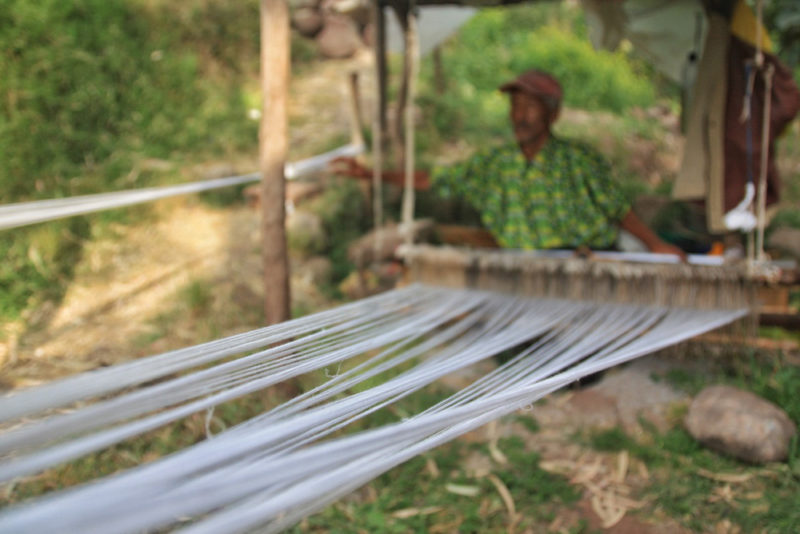
When we arrived in Ethiopia in late 2016, we had no clue about any unrest within the country. A country divided by a major ethnic group that has no role within the government, and the Tigray government were at arms. There have been protests in which people have died, including a few foreigners who unfortunately were in the wrong place at the wrong time.
But while the issues in Ethiopia still exist, they are not as heated as they were in 2016. Foreigners were never targeted and it still is a safe country to travel to with some precautions. We will touch on those in this guide.
In Ethiopia, natural beauty runs wild. The East African Rift system rips through the landscape to form beautiful mountains, high plateaus, and highly active volcanoes. Major sights include the rock-hewn Churches in Lalibela and Tigray, the impressive Simien Mountains, the tribes in Omo Valley, and the street hyenas in Harar.
There are so many wonderful places to visit in Ethiopia. Read on to learn everything you’ll need to know to plan a trip to this spectacular country!
Content and photographs provided by Yana Kogan and Timon .
Disclaimer: This post may contain affiliate links. If you make a purchase or booking through one of our links we may earn a small commission (don’t worry, it’s at no extra cost to you).
Important Travel Tips to Visit Ethiopia
Visa entry to ethiopia.
A one-month, single-entry visa is available upon arrival when flying into Addis Ababa for $40 if you are a resident of Europe, the USA, Korea, China, and several other countries.
For the latest information, please refer to the Ethiopian Embassy website .
The main language in Ethiopia is Amharic, but many tribal languages also exist, including Tigrinya, Oromo, and Afar. Many people also speak English, as it is taught in schools across Ethiopia.
The Ethiopian Birr is the national currency. For tours, some companies also price in USD. In 2021, the exchange rate was as follows:
- $1 = 48.25 Birr
- €1 = 54.25 Birr
Costs in Ethiopia
Ethiopia is a good place to visit on a budget. It is excellent for budget backpackers and independent travelers looking to explore places that are not overrun with tourists. However, the country is large and transportation takes time unless you fly, so having the proper amount of time is crucial.
A budget of $20 – $40/day can easily get you by in Ethiopia. The biggest variables are the tours and trekking options. Some of the main highlights that can get expensive include:
- Danakil Depression Tour ($350-400)
- Omo Valley Tour ($600)
- Simien mountain trekking ($160)
- Lalibela mountain trekking ($75)
- Lalibela churches ($50)
Domestic Flights in Ethiopia
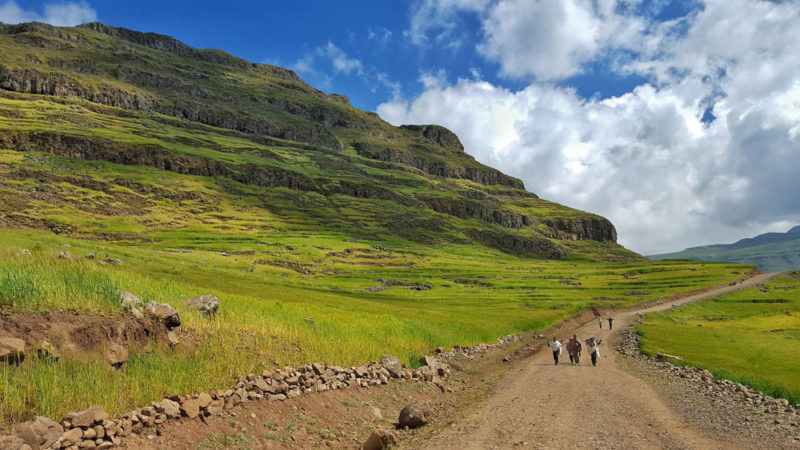
If you are flying at least one leg into Ethiopia on an Ethiopian Airlines flight, you will qualify for reduced fares on domestic flights. Domestic flights with reduced fares cost between $50 and $90 per flight. Book at an Ethiopian Airlines office on arrival or call a local branch. We recommend flying in Ethiopia between destinations to make it a safer journey.
Most bus companies in Ethiopia are owned by Tigray companies or the government. During protests and unrest, buses often are a target during riots. They have been known to be attacked by protesters, and while they almost always let passengers off unscathed, they will destroy the bus and burn it in the streets.
This caused us to alarm, so we flew between all our destinations. We felt safe during our time in Ethiopia, but this was the one area we felt was too risky. Make sure to ask locals in Ethiopia how the bus situation is at the time so you can decide if they are safe to use.
Accommodations in Ethiopia
A clean and basic double room in Addis starts around 450 Birr ($20) up to 800 Birr ($36). Outside of Addis, rooms are considerably cheaper. Basic hotels include Wi-Fi and hot water, and cost around 300 Birr ($13) for a double room.
Note: Bedbugs and bed fleas are a common issue in Ethiopia and something to be aware of when staying at budget hotels. The only way to kill bedbugs is in high heat (a dryer), and outside of Addis, no one owns or uses dryers, so it is a constant issue in Ethiopia.
Food in Ethiopia

Food is one of the many highlights of Ethiopia. Injera, a slightly fermented, sour, and sponge pancake-like bread, is at the heart of every meal. It is served with an assortment of spicy and flavorful vegetarian or meat options.
Every Wednesday and Friday are fasting days when vegetarian or vegan cuisine is available. Coffee is exceptional and a huge part of the social scene and culture in Ethiopia. Typical costs are around:
- Main food dishes cost between 30 Birr and 50 Birr at local restaurants (~$1.25 – $2.50)
- Coffee costs between 5 Birr and 8 Birr (~$0.30)
- Beer is widely available from 14 Birr (~$0.60)
Theft in Ethiopia
Theft is a major problem in Ethiopia, especially in Addis Ababa. Addis is the pickpocketing capital of the world. One day while walking around the Piazza area, we were surrounded four times and attempted to be robbed. And we knew several backpackers who had their phones or wallets stolen in broad daylight.
This problem, unfortunately, is commonly homeless children. They will try to trick you by getting close to you with a piece of paper or kleenex, pretending to sneeze on you, or pretending to beg. While this is going on, a group of other children will come from somewhere else and pick-pocket your belongings.
To stay safe, just DO NOT bring anything with you while exploring Addis. We carried one cell phone and nothing else. I made sure it was in a zipper pocket and guarded it. It is an uncomfortable feeling and a constant nuisance in Addis. Outside of Addis, the problem is not as bad. In some areas such as Tigray, theft is not nearly as common.
2016 – 2018 Travel Advisory
During the 2016 Rio Summer Olympics, runner Feyisa Lilesa from Ethiopia garnered international attention. When he crossed the finish line, he made a public stance, using his arms to mark an X above his head to protest against the Ethiopian government.
As I mentioned earlier, there has been political unrest and several protests that have turned violent. The situation has been much better, but ensure you check your home country’s travel advisories prior to planning a trip.
Top Places to Visit in Ethiopia
Addis ababa.
The capital city is a major hub in Africa and the likely point of entry and exit when you visit Ethiopia. But we do not recommend staying long in Addis Ababa. The sights are not great and the pickpocketing is the worst we have ever seen. We recommend using it as a quick stop to move on to your next destination in Ethiopia.
If you do plan to sightsee, check out the Red Terror Museum, St. George Church, the Piazza, and the Merkato. Leave valuables at your hotel, especially when visiting populated areas, such as the Piazza or Merkato.
Stay : The Bole street area is newer and closer to the airport. It is much safer and cleaner than Piazza with less harassment from the locals. Hotel Tirago has very nice, clean rooms for a reasonable rate.
Lalibela is in a beautiful mountainous region to visit in northern Ethiopia. Thousands of Coptic Christians pilgrimage here to visit the 900-year-old rock-hewn churches. Ethiopia has some of the oldest churches in the world, dating back to the fourth century. During the 12th century, Muslim conquests in the Holy Land pushed out Christianity. Lalibela took its place, earning the nickname New Jerusalem.
No stop to Ethiopia can be complete without visiting this devout and religious place. However, the churches are not the only draw in Lalibela. After a full day or two of visiting the 11 rock-hewn churches, head out for a community hike to Abuna Yosef mountain. This three-day hike starts in Lalibela, and ventures into the mountains to small villages staying two nights in a traditional mud hut.
Stay : Halle Hotel Lalibela has simple, no-frills rooms that are comfortable and clean.
Danakil Depression
The Danakil Depression is in the northeast corner of Ethiopia, not far from Eritrea. This region is one of the harshest in the world. In one of the lowest elevations (-400 feet / -125 m), this place also is one of the hottest on earth.
Due to three tectonic plates meeting at this spot, it has sights unlike almost anywhere else on earth. Take a tour to the Danakil with the major stops at the Dallol sulfur springs, watch camel caravans to and from the salt lake, and hike up Erta Ale volcano to witness one of only five active lava lakes in the world.
Stay : Mekelle Hotel in Mekele has really reasonably priced rooms.
The Tigray region is the northernmost of Ethiopia and has been a formidable and large part of Ethiopia’s storied past. Many activities are in the Tigray region so you’ll want to stay for a few days.
Hit the mountains and go on a hike to a cluster of rock-hewn Churches in Wukro and/or Hawzien. Visit the storied past and ruins of Yeha. Climb up a cliff face with the assistance of a monk to one of the most famous monasteries, Debre Damo (only men are allowed). Check out the tombs, obelisks, and of course, the current location of the Ark of the Covenant in the city of Aksum.
Where to Stay :
- Hawzien – Vision Hotel has rooms and wifi for 300 Birr
- Wukro – Hewan Pension has basic rooms for 250 Birr
- Mekele – LK Pension has clean rooms with an ensuite for 300 Birr and a shared bath for 200 Birr
- Aksum – Unlike what many tourists and lonely planet say, do not stay at Africa Hotel. There is a history of bed bugs and it seems to have come up again in late 2016. Stay nearby at The Ark Hotel instead, with rooms from 250 Birr
Other Areas of Ethiopia to Explore
Head to Gondar and the Simien Mountains for a multi-day trek into the vast wilderness and craggy peaks surrounded by lush green valleys. Hikes are between two and ten days. It is possible to hike all the way from Simien to Lalibela.
Hiking in this region is strenuous and very remote. Getting a guide or scout is required by the Ethiopian government. If you book ahead with a tour company, guides are expensive and can cost around $100 USD per day. However, if you are on a budget, it is much cheaper if you organize at the park entrance.
The park office is in Debark, where the hike also begins. At the park office, you can ask for a scout (not a guide) and a mule (i.e. a local porter). You can save more than half your money by booking on your own and not hiring a full team to support you. Agree to a price with the scout and porter, and pay park fees of 90 Birr per person and 40 Birr each night tent camping.
Visit this UNESCO World Heritage City to enjoy a different experience from the rest of Ethiopia. Harar, a walled city, is predominately Muslim, and home to many mosques, markets, and lively vendors. A walk through the small alleyways will take you back in time.
The Jegol Wall is a great place to walk around. Also, check out the city hyenas and a long-standing tradition where you can feed meat to the hyenas yourself. Harar is also the gateway to overland into Somaliland for adventurous backpackers.
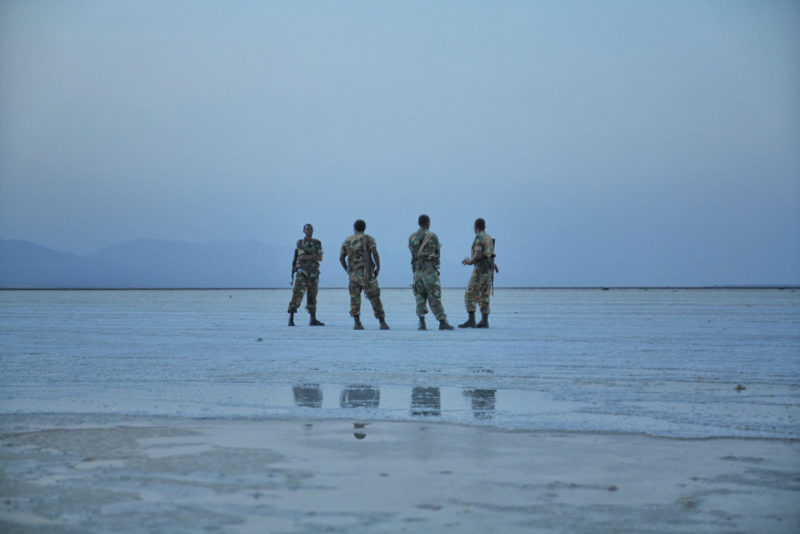
In the southern part of Ethiopia, the Omo Valley is home to many Ethiopian ethnic groups, known for their eclectic piercings, tattoos, and body paintings. Believed to be some of the most fascinating tribes left in Africa, this also has become a major tourist destination.
Inflated prices (tours upwards of $600 per person) and additional costs for photography of each person are often reasons some skip this region altogether. However, you will get a cultural experience that is nearly lost in all of Africa.
Sample 3-week Itinerary
- Spend 1-2 Days in Addis Ababa
- Trek the Simien Mountains for 5 days with a stop in Gondar
- Explore the ruins and tombs in Aksum for 1 day
- Spend 2 days in Tigray hiking up to rock-hewn churches
- Go on a 4-day tour to the Danakil Depression
- Spend 4 days in Lalibela exploring the Churches and a community hike
- Feed Hyenas and shop the bazaars in Harar for 2 days
That’s it – we hope you have a fun stay on your Visit to Ethiopia!
Share this on pinterest.
About the Author:
Yana & Timon met at college in Boston, Massachusetts. After graduating, they started their professional careers. They moved to San Francisco in 2010, a city they loved living in for nearly six years. After working and saving up money for several years, they quit their jobs and set off on an adventure of a lifetime. They started living a nomadic lifestyle in December 2015 and have not looked back since.
View all posts
Related Posts
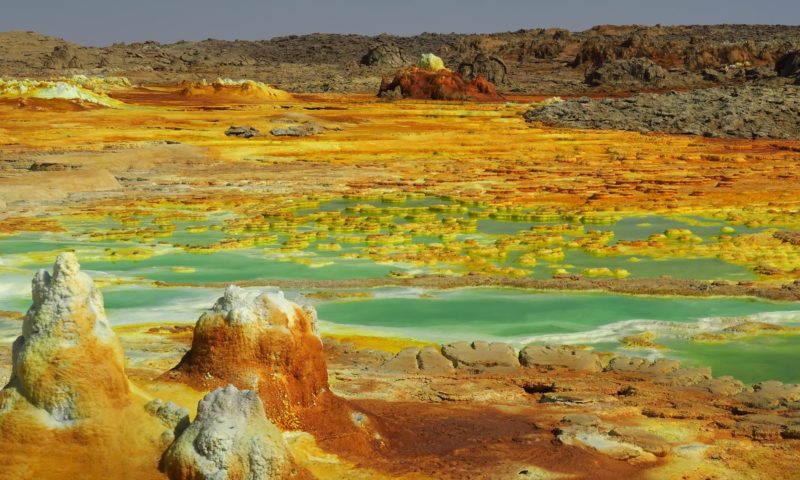
A 4-Day Danakil Depression Tour in Ethiopia
Guide to Lalibela Churches and the Abuna Yosef Hike
1 thought on “visit ethiopia: a complete travel guide”.
Hello Yana and Timon, I like your 3 week travel plan. I am inspired to travel to Ethiopia by next month in mid-November. What travel company or tour guide do you recommend that I can consider using that can encompass your following recommendations?: Spend 1-2 Days in Addis Ababa Trek the Simien Mountains for 5 days with a stop in Gondar Explore the ruins and tombs in Aksum for 1 day Spend 2 days in Tigray hiking up to rock-hewn churches Go on a 4-day tour to the Danakil Depression Spend 4 days in Lalibela exploring the Churches and a community hike Feed Hyenas and shop the bazaars in Harar for 2 day Thanks in advance for your suggestions.
Leave a Comment Cancel Reply
Your email address will not be published. Required fields are marked *
The 22 Best Places to Visit in Ethiopia
With the most UNESCO World Heritage Sites than any other African country (including Egypt), Ethiopia is a hidden gem that is overlooked by many travellers. With such cultural diversity, archaeological pedigree and natural beauty, there's a good reason why its a so high on the Wild Frontiers travel list.
From our years of experience travelling in Ethiopia, we have pulled together what we think are the best places to visit in Ethiopia. So, let us jump into it.
Addis Ababa

Ethiopia's capital is located more or less in the dead centre of the country and is the world's third-highest capital at 2,400 m. Its name means 'New Flower' and it is a relatively modern city, founded in 1887 by Emperor Menelik II. In just over a century it has grown from nothing into a modern metropolis of several million people. Its altitude lends it a comfortable climate and throughout the year the weather is temperate with just the occasional downpour.
The northernmost city in the unspoilt Tigray region, Adigrat is an ideal stopping point en-route from Axum to Mekele. Although the town itself is nothing special, a new lodge has recently opened on the outskirts of town, which is a comfortable base to explore the rock churches for which the Tigray region is famed.
MORE INSPIRATION IN ETHIOPIA
With stunning views in all directions, the town of Arba Minch is situated in a truly spectacular location. It lies at an elevation of 1,300m in the foothills of the Rift Valley and mountains rise up to almost 4,000m to the west. The town comprises 2 separate settlements, Sikela and Shecha that are 4 km apart and connected by a sealed road, so although the total population is around the 75,000 marks it still retains a small-town atmosphere.
Awash National Park
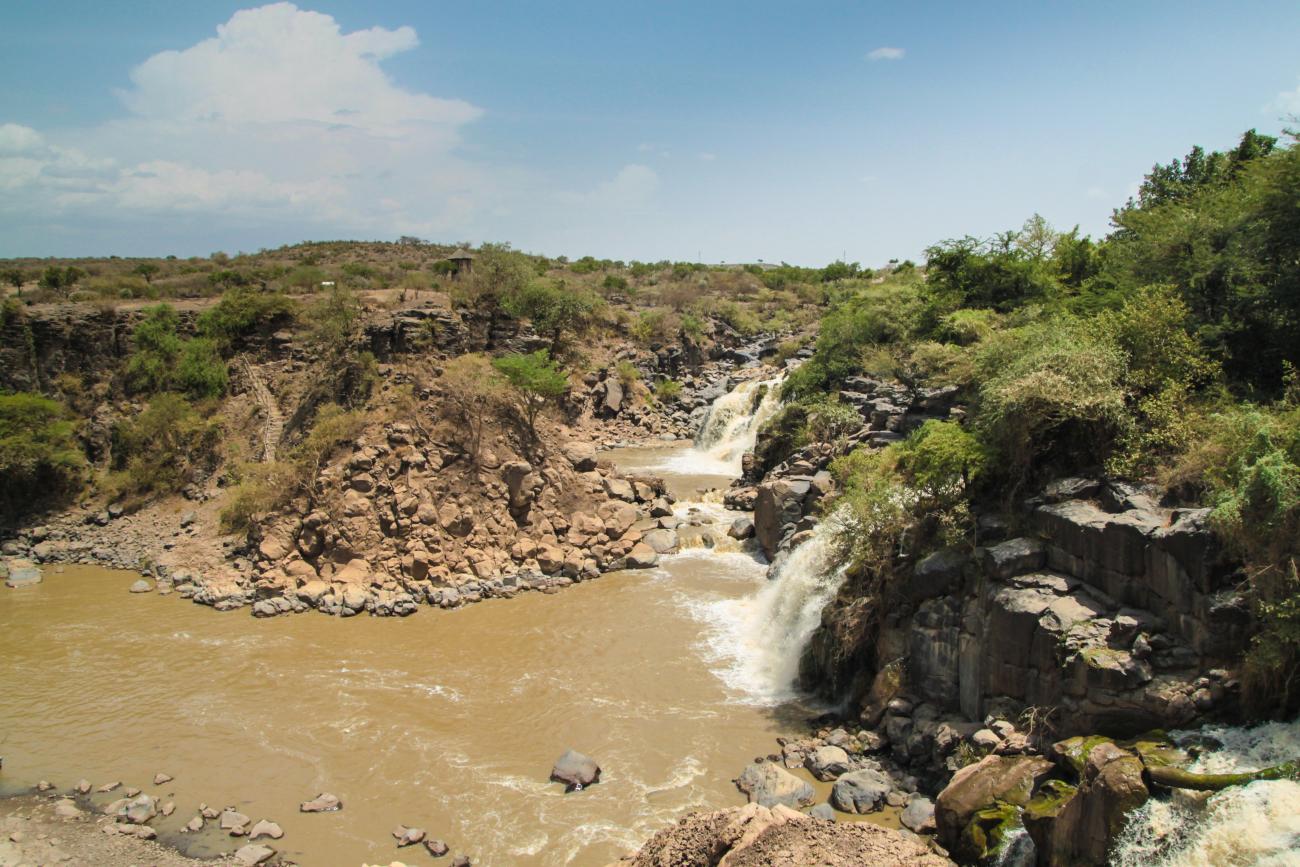
This scenic national park is situated in the dry acacia savanna of the Rift Valley some 200km from Addis Ababa. A magnificent 150m-deep gorge, carved by the Awash River, forms the southern boundary of the park, including a substantial waterfall. To the north, you'll see the ragged edges of Mount Fantelle, a dormant volcano whose crater towers above the surrounding bush.
Other highlights include the Filwoha Hot Springs, which feed a series of beautiful translucent blue pools and Lake Beseka. Although 80 mammal species have been recorded in Awash, the game viewing is less of an attraction than the scenery and birdlife. Awash National Park is regarded as one Ethiopia's top birding destinations, with over 450 species. Including the endemic yellow-throated serin and the Ethiopian cliff swallow.

This fascinating town was the centre of the Axumite Empire, one of the most important and technologically advanced civilisations of its time and a major force in world trade between the 1st and 7th centuries AD.
A further twist in the town's long history is speculation that it could have held the court of the Queen of Sheba and also that it is the final resting place of the Ark of the Covenant. Whatever the truth of these matters it is undoubtedly the holiest city of the Ethiopian Orthodox church and there is a startling wealth of antiquities both to be seen and as yet still undiscovered.
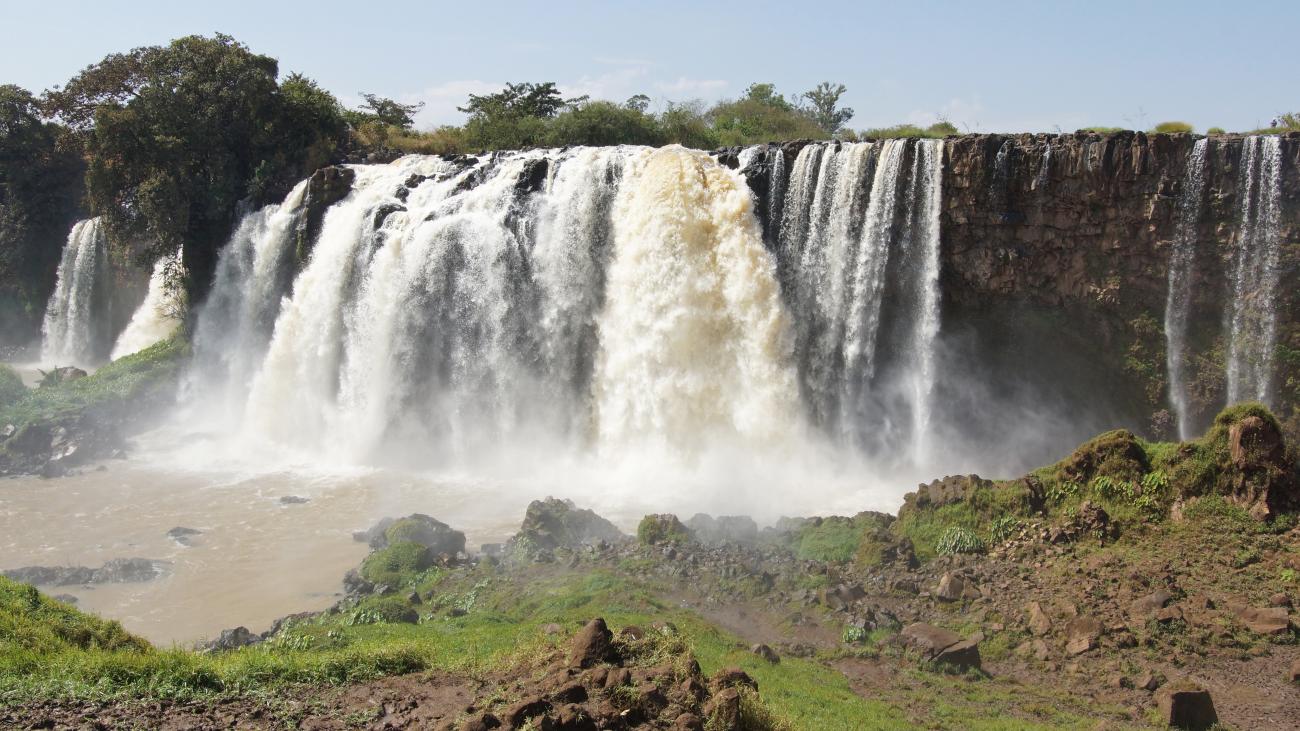
Bahir Dar, with its wide avenues of palms and scenic lakeside location, is one of Ethiopia's most attractive towns. Located on the southern shore of Lake Tana, it is an ideal base from which to explore the lake and surrounding area, which includes the blue nile falls.
Once no more than a sleepy fishing village it has grown in size during recent times and palm-lined avenues and lakeside vistas make it an attractive place to stay. There are good amenities for travellers and the town itself has become an important industrial centre partly as a result of the hydro-electric dam built at nearby Tis Abay.
Bale Mountains National Park
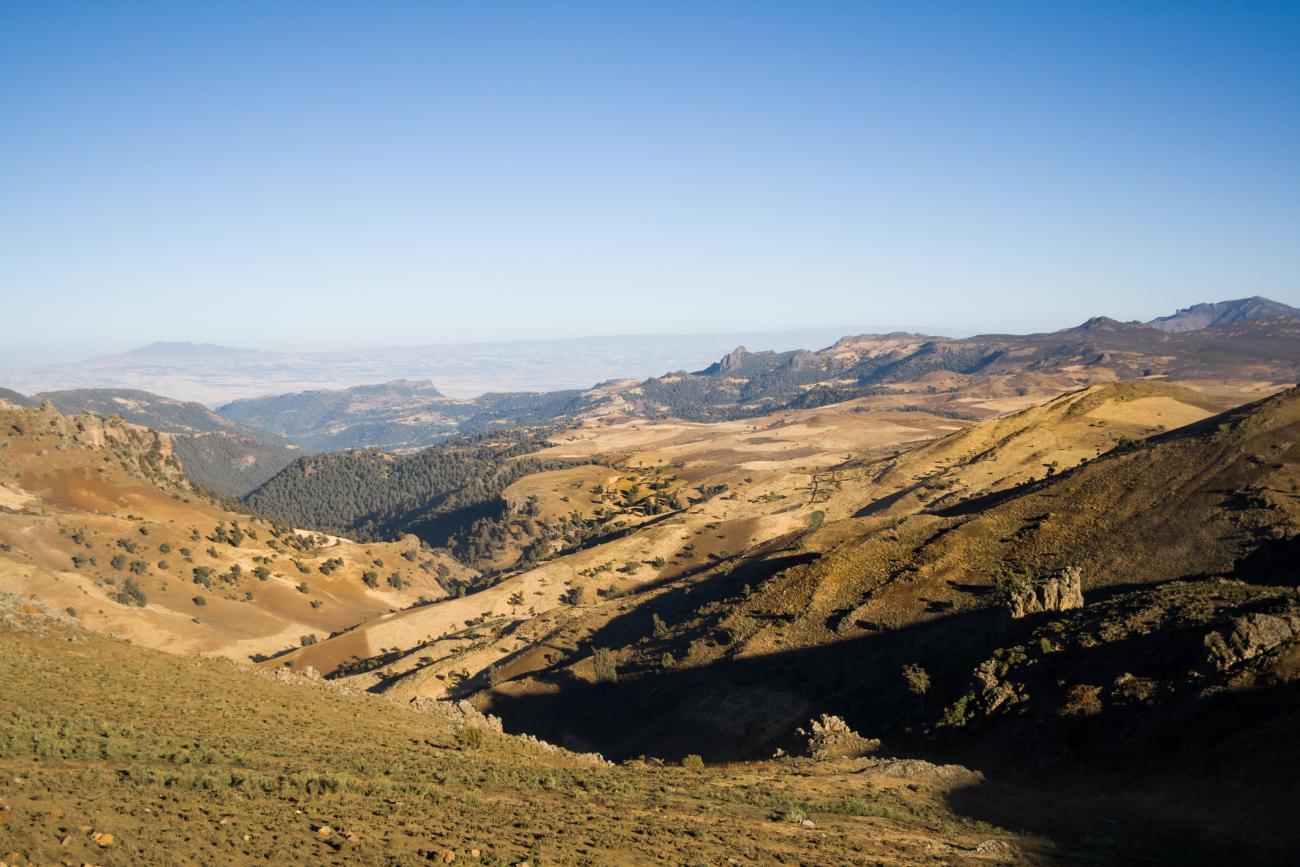
The Bale Mountains National Park is a protected area of approximately 2,200 km2 and is located around 400 km southeast of Addis Ababa. Its high mountains, sweeping valleys, dramatic escarpment and wide expanses of forests provide visitors with a diversity of vistas unique to the Ethiopian highlands.
UNESCO has estimated that more mammal species would become extinct were the habitats of the Bale Mountains to decline than if any other area of equivalent size on the globe were to disappear. When this is combined with rare amphibian species, endemic birds and spectacular flora, it is easy to see why the park is designated as a Biodiversity Hotspot by Conservation International.
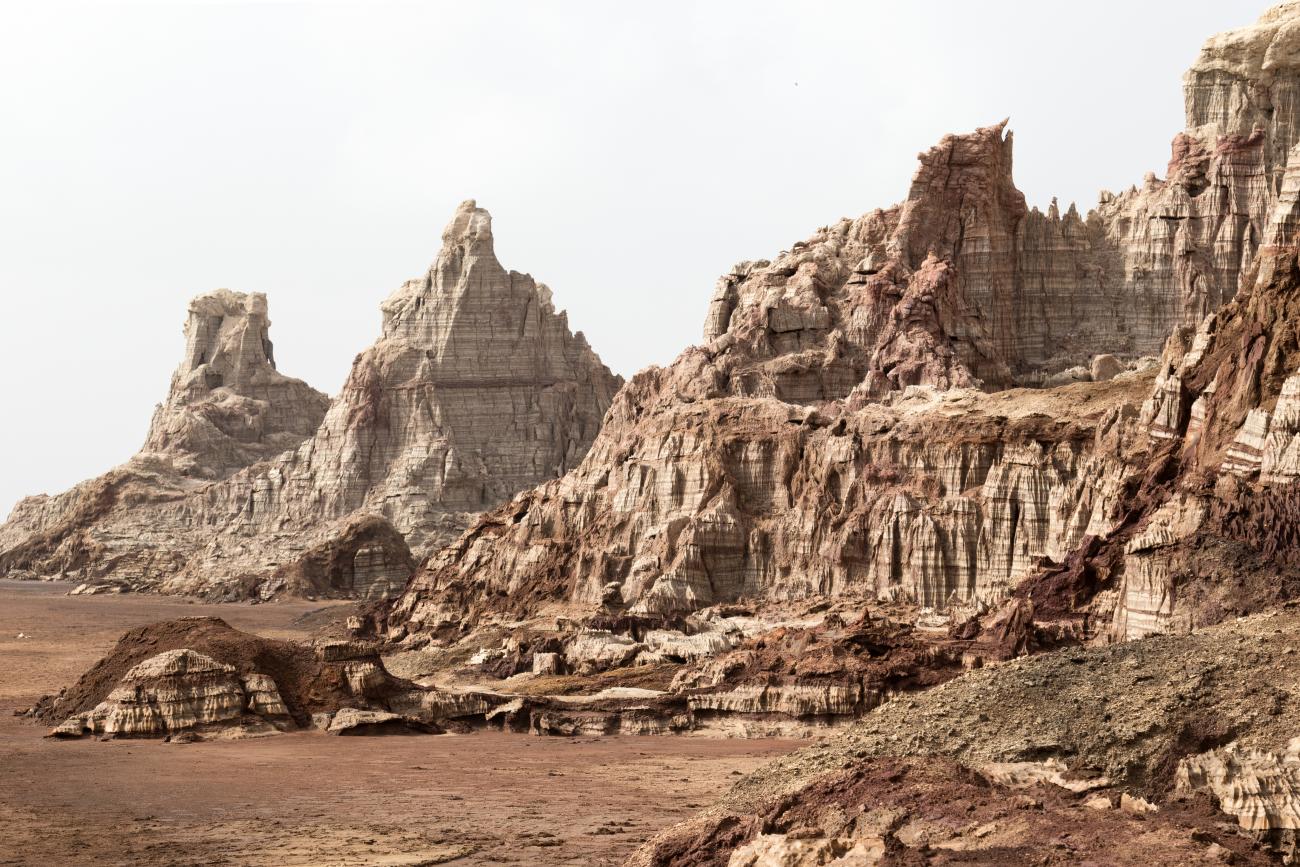
The Danakil Depression is found in Northern Ethiopia, close to the border with Eritrea. With parts of Danakil 100 metres below sea level, this is one of the lowest places on Earth and also one of the hottest in average yearly temperature. Access is difficult as the area is only passable for 4x4 vehicles and accommodation is scarce meaning visitors camp each night at fixed sites. Arguably one of the best places to visit in Ethiopia, those that do make the journey are rewarded with some of the most extraordinary landscapes anywhere on earth.
Two active volcanoes, Mount Ayalu and Erta Ale have large lava lakes, whilst the Dallol Sulphur Springs is a photographers' dream. The Awash River ends in a huge salt mine, where workers carve rough-hewn blocks of salt for sale, an extraordinary sight to behold.
.jpeg)
This unspoilt corner of North Eastern Tigray is scenically spectacular with vast spaghetti-western landscapes of flat dry plains and towering rock outcrops known as the Gheralta. The region is most famous for its 35 old rock-hewn churches, the largest concentration anywhere in Ethiopia. The finest are found in splendid isolation on the outcrops and involving a strenuous walk, and the magnificent views, atmospheric interiors and a wealth of old paintings and church treasures are very special indeed.
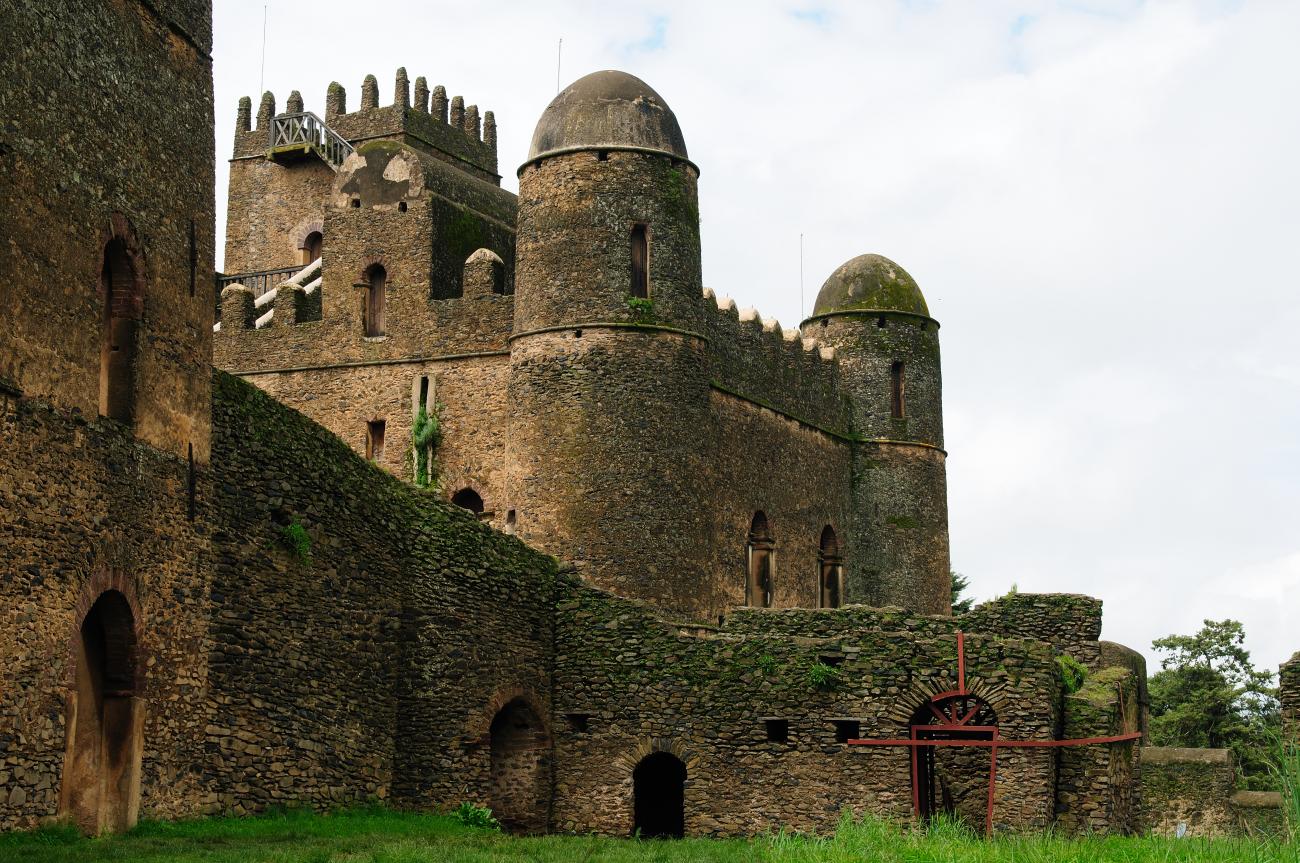
Up until the beginning of the 17th century, Ethiopia had what was locally referred to as a 'mobile capital'. But in 1632 Fasilidas took the throne and proclaimed Gonder as his capital, where it remained for the next 200 years. As king and emperor Fasilidas not only ushered in a period of relative calm in Abyssinia's turbulent history he also built a stupendous fort at this strategic location - added to by his successors - most of which is still intact. Wandering around the fort's spectacular turreted citadels, vast banqueting halls and bathhouses leaves you in no doubt whatsoever as to the importance of this Christian kingdom 400 years ago.
Danakil Depression
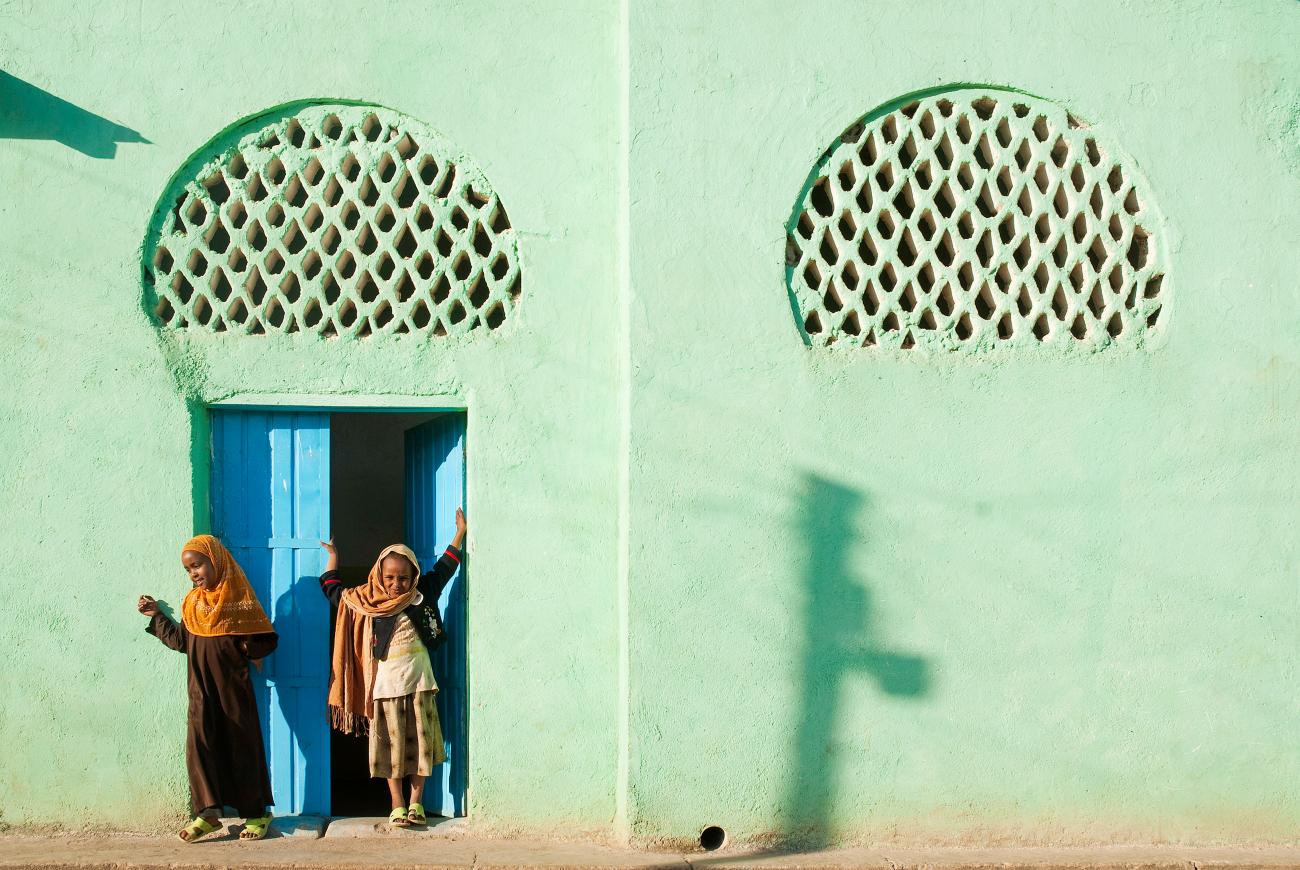
Harar is one of the most impressive of Ethiopia's historic sites, reflecting the long and colourful history of the country. Located in the East of Ethiopia, it was founded in the late first millennium BC and became a stronghold of Islam. Harar has been ruled by seventy-two successive Imams since its formation, through which time unique traditions have been born.
It is one of the main Muslim pilgrimages and has many fascinating sites including the old walled town which was established in the 1540's and contains 90 mosques. One of the town's ancient traditions has also become one of its main attractions; every day a selected resident goes out of the city and calls the Hyenas that live in the surrounding areas, only to feed them by hand.
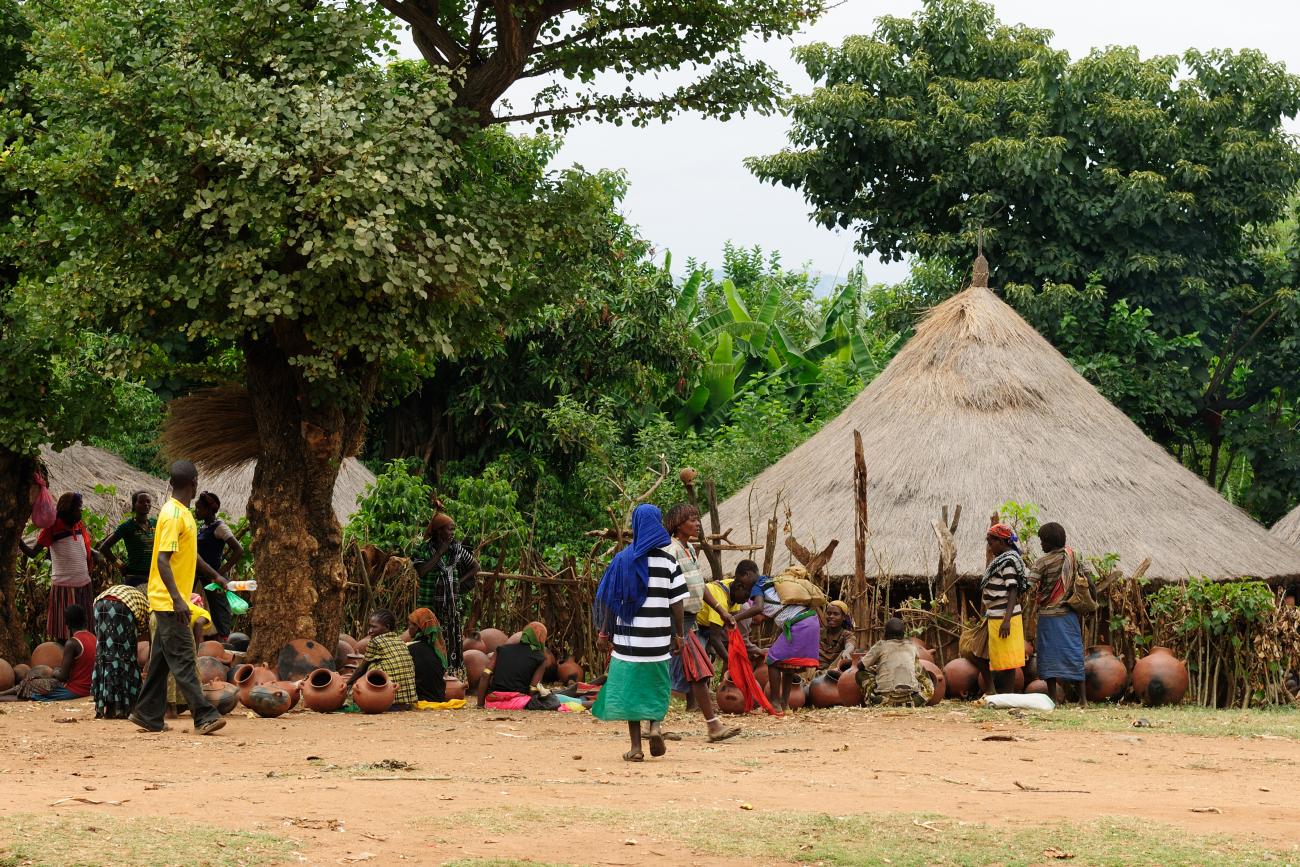
Although Jinka is the administrative capital of the South Omo zone it exists in almost isolation from the rest of the country and has a relaxed, rural feel. Set at an altitude of 1490m it is quite temperate and its Saturday market attracts traders from all over the area.
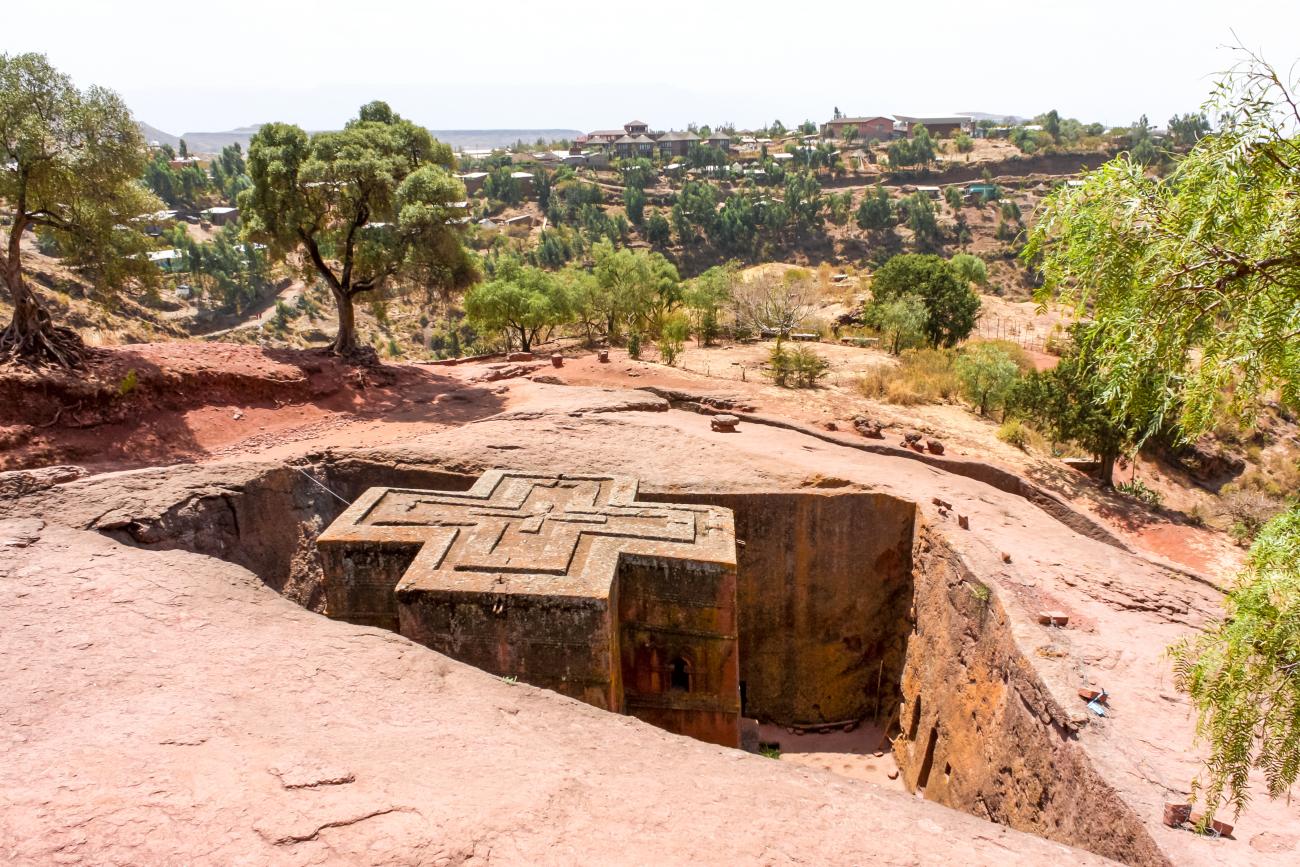
The isolated town of Lalibela, situated high up in the Lasta Mountains, is famous throughout the world for its incredible rock-hewn churches. At 2,630 m and perched among wild mountains, the setting is fantastic.
From the 10th to the mid-13th century it was the capital of the Zagwe Dynasty that ruled the country and it was under the direction of its most famous King, Lalibela, that the churches were carved. He gathered together the greatest craftsmen possible and some estimates think as many as 40,000 people were required to create the churches.
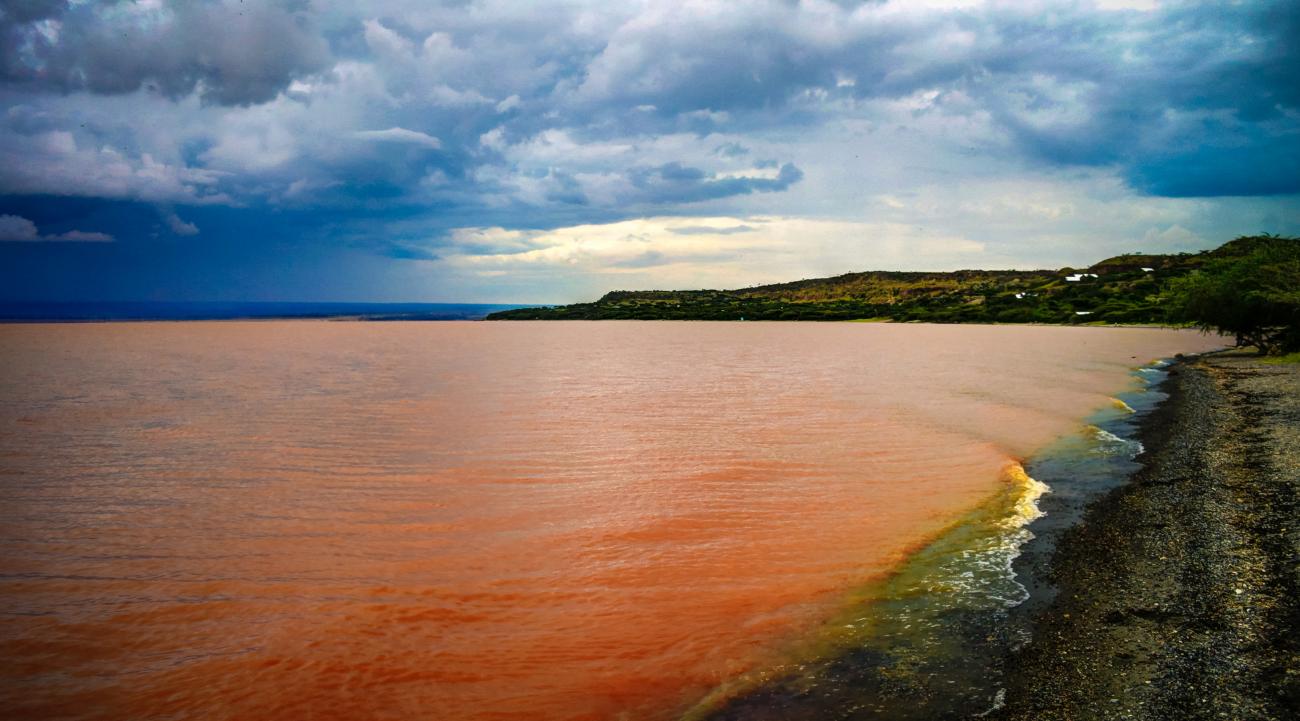
Of all the Rift Valley lakes, Lake Langano is the most developed for tourism, lying adjacent to the Abiata-Shals National Park that is dominated by the two lakes for which it is named. Lake Langano is 18 km long and 16 km wide and its soft brown waters are set against the blue backdrop of the Arsi Mountains, which soar to 4000 m. Although the area around the lake is largely deforested, a variety of wildlife live here including hippos, monkeys, baboons, warthogs, and a huge variety of birds.
Mago National Park
Mago National Park is bisected by the Mago River and is dominated by dense acacia woodland and patches of open savannah. Pristine rainforest lines the river and the highest peak is Mt. Mago at 2,528 m.
Over 100 mammal species live here and once the huge herds of buffalo roamed this area but numbers have dwindled dramatically. However, it is still possible to see elephants, Defassa waterbuck, Lelwel hartebeest, greater and lesser kudu and Guenther's dik-dik.
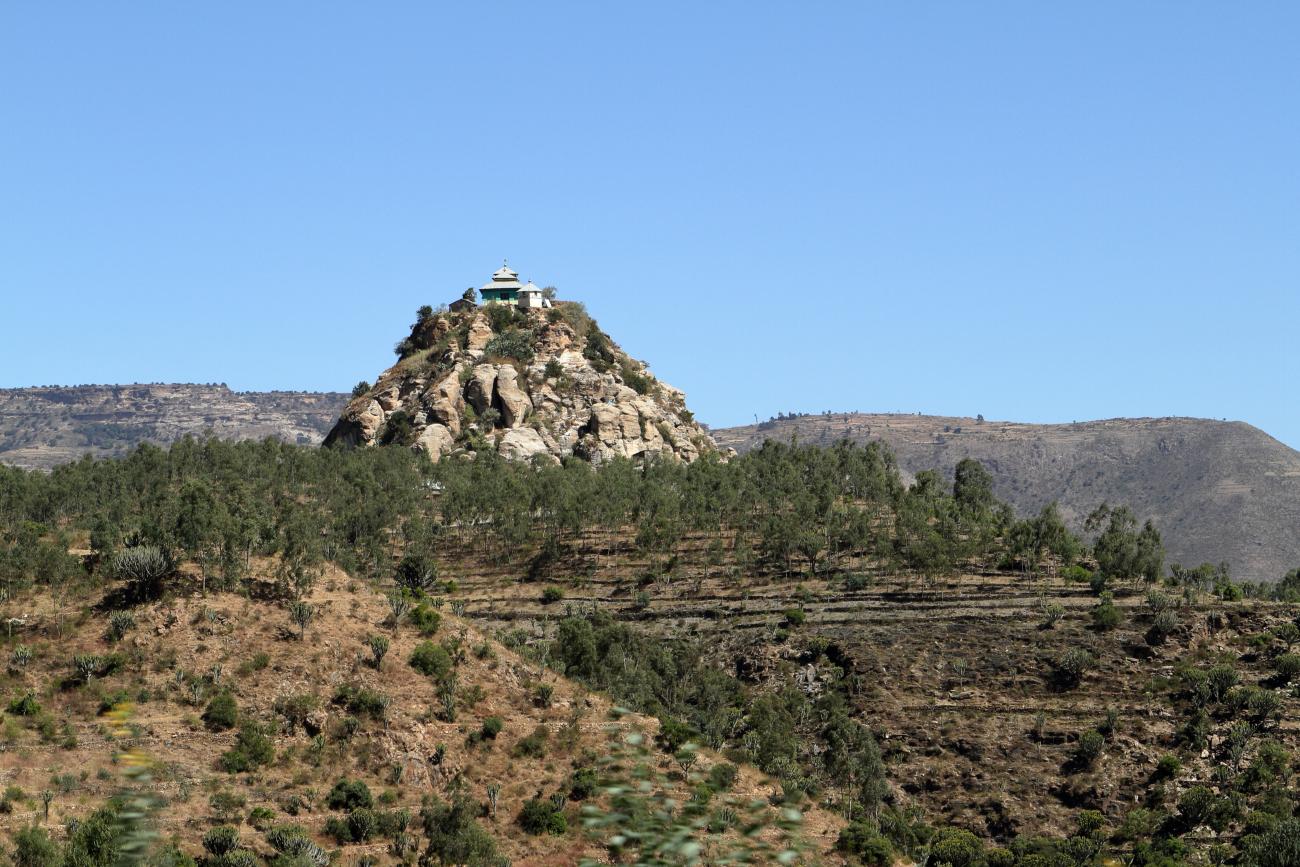
Founded by Emperor Yohannes IV in 1881, Mekele is the main and most modern city in the Northern region of Ethiopia and tourism infrastructure is better than in other parts of the country. Set in a basin at 2,200m in the rocky Tigraian Highlands, the city is clean, organised and vibrant. There are many excellent restaurants and it makes a good base from which to explore the surrounding area.
Two hours outside of Lalibela, Meket offers spectacular rural scenery. At over 2500 metres, the views from the escarpment are breathtaking and perfect for exploration on foot. It is here we arrange two to five-day community treks providing a remarkable insight into local Ethiopian life.
Nazret, also known as Adama, is the third-largest town in Ethiopia. Perched at an altitude of around 1,600m on the fertile plateau that divides the narrowest stretch of the Ethiopian Rift Valley from the central highlands. It is a laid back almost countrified town with a good range of restaurants and a number of local hotels. Whilst it has little of huge interest to tourists it provides a good stopping point between Awash and Addis Ababa or for those travelling South to the Bale Mountains.
Nechisar National Park
This is one of the most beautiful game reserves in Africa and the park protects the white grass plains and also parts of Lakes Chamo and Abaya. The park and lakes support a large number of different species of wildlife including hippo, crocodile, Burchell’s zebra, waterbuck, Grant’s gazelle and as usual a wide variety of birds. The terrain is varied too from savannah plains to groundwater forest where it is common to see vervet monkeys and baboons.
Simien Mountains
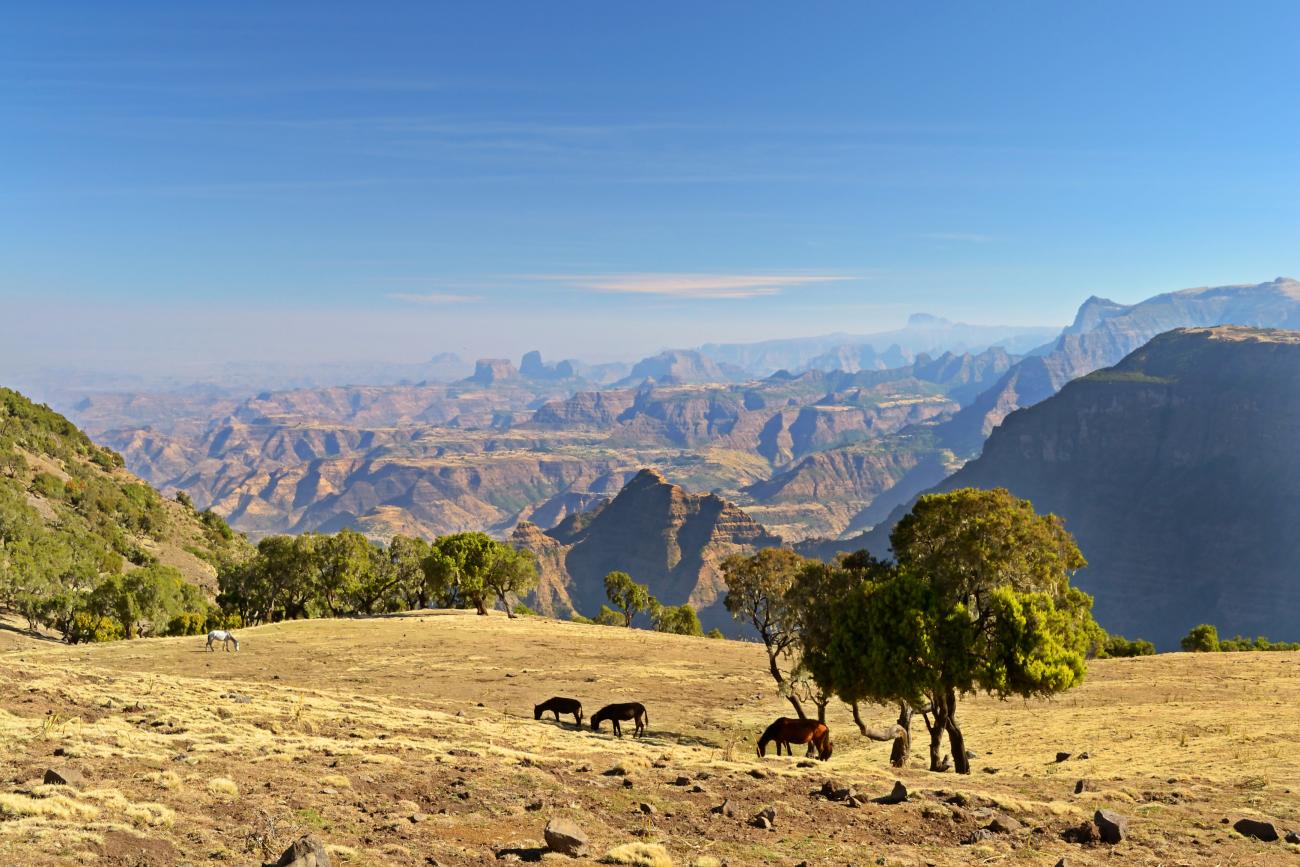
Climbing to an altitude of 4,620m, stretching 100 miles east to west, the Simien Mountains are one of the largest ranges in Africa. With their vaulting granite columns, towering escarpments and plummeting valleys, they are also among the most spectacular.
Besides the colourful Ahmaric tribes, the Simien Mountains are also home to a vast assortment of wildlife, where Gelada Baboons, the Simien fox, bushbuck and the magnificent Lammergeyer vulture can be found. But the wonder of the Simiens does not lie so much with the animals or the people that live there, it is simply to watch the sunrise or fall over a land that time forgot.
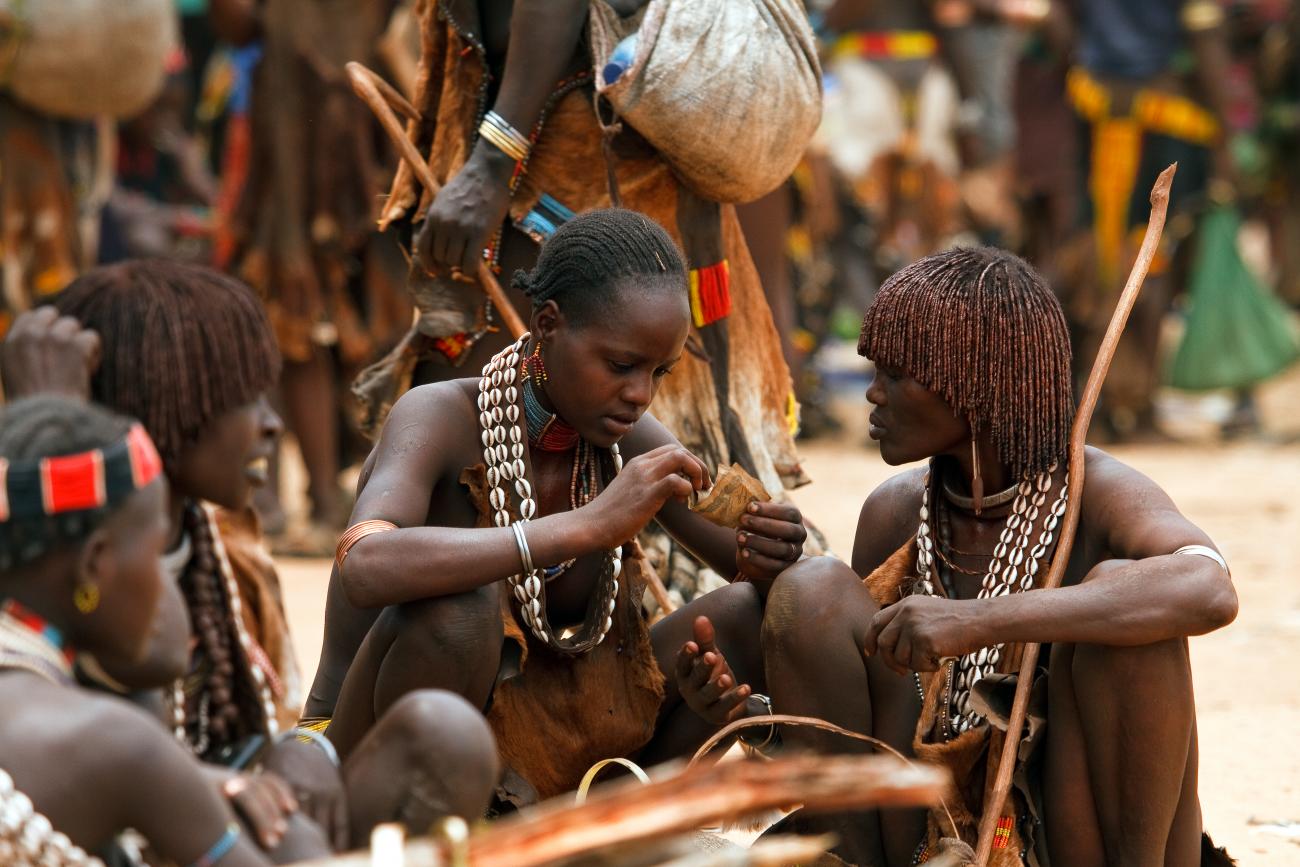
This traditional town, not far from the Kenyan border, lies right down in the heart of the south Omo region and is an important transport hub, located at a three-way road intersection. It is the main town of the Hamer people and is known throughout the Omo Valley for its colourful Monday market, one of the most important in Hamer country.
In southern Ethiopia, in the heart of a landscape dotted with wild coffee trees and enset (false-banana tree) plantations, sits the town of Yirga Alem. Just over 250 km from Addis Ababa, Yirga Alem is in itself somewhat unremarkable but is home to charming Aregash Lodge, a lovely place from which to explore this little-known part of the country, well away from the more popular, well-known circuits.
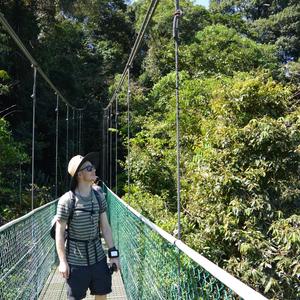
Harry Foskett
View harry foskett's latest blog posts, related tours.

20 Things to Know Before you Visit Ethiopia
This month I was lucky enough to spend a little over a week in Ethiopia. Though I would have loved more time on the ground, I was pleasantly surprised by how much you can see and experience in Ethiopia in a short amount of time. Ethiopia is definitely more about the journey than the destination and more than anything, it is a test in patience. These are the things to know before you visit Ethiopia to help you make the most of your trip.
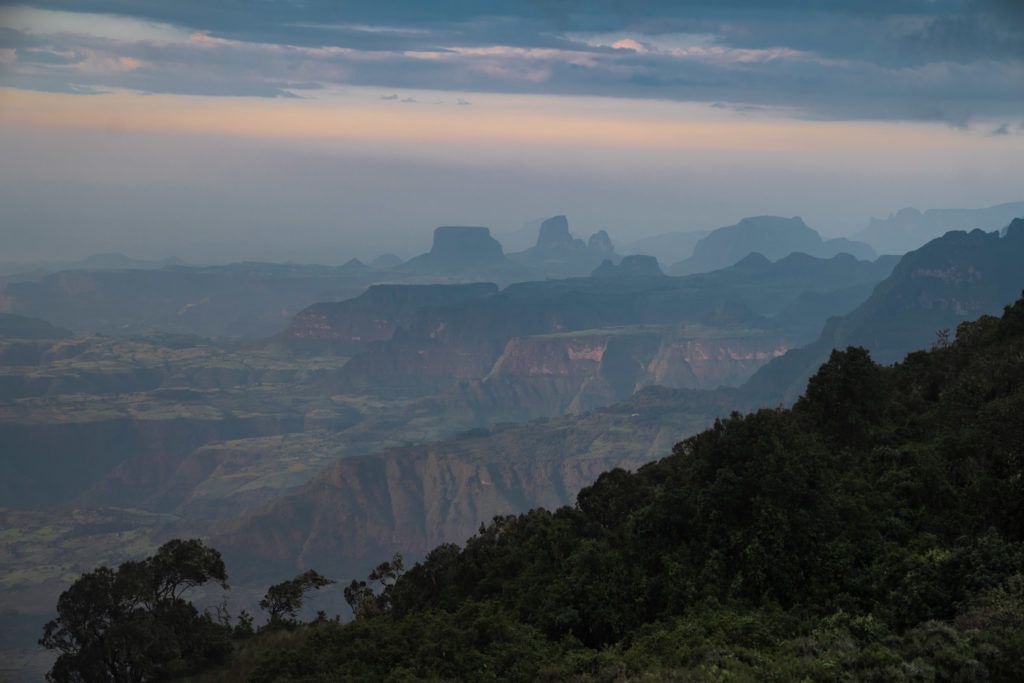
Things to Know Before you Visit Ethiopia
1. save on flights by booking with ethiopian airways.
Before you visit Ethiopia, it is important to know that you will save a lot of money by booking with Ethiopian Airways if you plan to fly within the country. If you fly in to Ethiopia with Ethiopian Airways you will get a huge discount on your domestic flights (around 50% off the price).
2. If this is your first time visiting, focus your efforts on the North or South of Ethiopia
When I began planning our trip to Ethiopia I was quickly overwhelmed by how many amazing cities and destinations there are within this country. It is tempting to try and “do it all”, however you would need at least a month to really see all the country has to offer. If you only have one or two weeks, I would recommend travelling to the North of Ethiopia. Highlights include Gondar , the Simien Mountains , Lalibela, the churches of Tigray and the Danakil Depression . If you have three weeks you could also include the South of the country where you can visit the Omo Valley and meet the tribes there.
3. Only book tours and transfers in advance if you are short on time
One thing we learned the hard way is how much more expensive it will be to book tours in advance. I had already heard from friends that this would be the case, however with such a strict schedule and only a week to see as much of Northern Ethiopia as possible, we decided to book our tour to the Danakil Depression ahead of time to be sure not to miss out. Instead of paying $325 (USD) per person, we ended up paying $500 per person. It turns out that despite us visiting during high season, there were plenty of tours departing every day with various tour companies . Save yourself a lot of money and book your tours on the ground… and always haggle for the price!
4. Pack the essentials, especially if leaving the cities
Our travels in Ethiopia were planned around the journey rather than the destination. Instead of endeavouring to visit all the cities, we spent most of our time hiking in the Simien Mountains and hiking a volcano in the Danakil Depression. For this type of adventure it is important to pack everything you will need as it is difficult (if not impossible) to find these things on the ground:
Talcum powder (to stay fresh when there are no showers!)
Hand sanitiser
Neck pillow
5. Ground transport vs. Flights is really just a question of time
If you are planning an adventure around Ethiopia you will have two options for transport: by land or by air. Travelling by land can only be done on the cheap if you have a lot of time to spare. Buses are often day-long journeys and rarely operate on a timed schedule. Private drivers are readily available but not much cheaper than flights and the roads in Ethiopia are often bumpy and dusty. If you are on a tight schedule, flying between major cities is the best option.
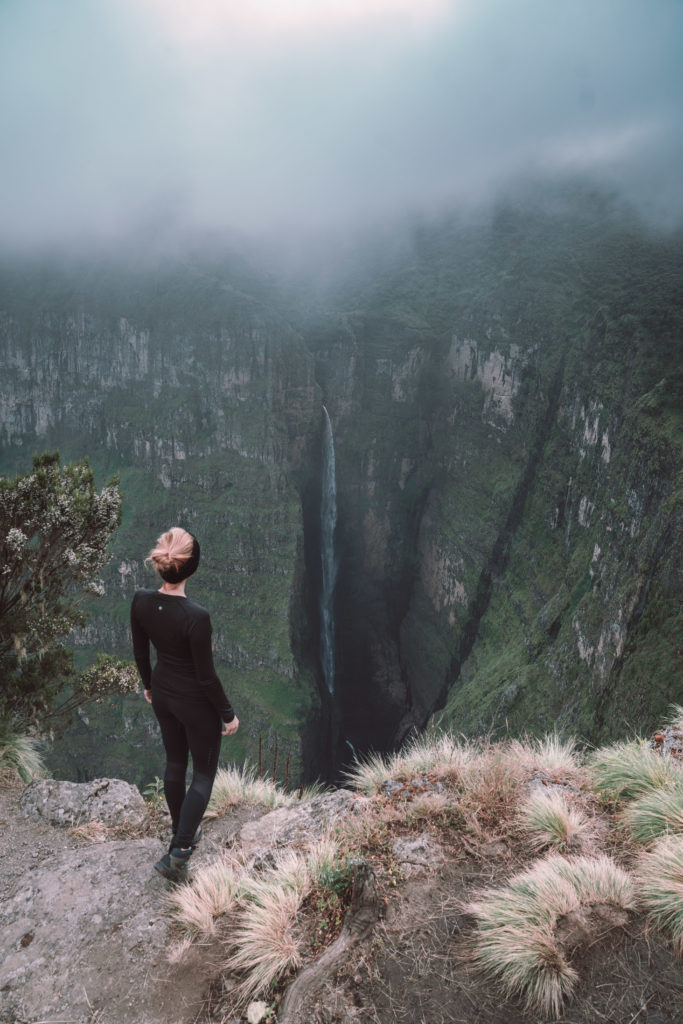
When you’re on the ground
6. expect delays in travel times.
Delays when travelling through Ethiopia are inevitable both on the ground and in the air. For our trip we felt like we had beaten the odds until our last flight from Mekele back to Addis Ababa when we were delayed four hours. The best thing you can do is expect delays to avoid disappointment. I wish we knew this before we visited Ethiopia to save the travel headaches! However, it all felt like part of the journey.
7. Ethiopians are really lovely people
When I told my friends and family I was travelling to Ethiopia they were surprised and often asked “is it safe?” Relatively speaking the country is currently safe to travel throughout without hassle. Ethiopians are incredibly hospitable people and very eager to share their culture, language and food with visitors.
8. You can’t exchange or use Ethiopian Birr at the airport
Be sure to use all of your Ethiopian Birr before you leave the country as it is not possible to exchange this currency when you leave the country and not even possible to use Birr in the airport as you leave. In fact much of the tourism industry price in USD or EUR.
9. Everything can be bartered
Prices in Ethiopia are almost always flexible. This is especially the case for taxi rates, tours, trinkets and almost anything in Ethiopia. If you think it sounds expensive, offer a lower rate and be prepared to barter. For that reason, i would suggest not booking tours before you visit Ethiopia as it will be cheaper to do so on the ground.
10. Use ATMs to withdraw cash
When we first landed in Addis Ababa I made a run for the exchange office to grab some cash for our taxi journey to the hotel. As it turns out you can only exchange a handful of currencies like USD, EUR and GBP. Instead I opted to withdraw cash from the ATM with no troubles and soon realise there are ATMs throughout the country.
11. Do not expect great wifi connection
This perhaps should go without saying but before you visit Ethiopia, I should warn you not to expect great wifi. Even the hotels and guest houses that offered wifi were slow and often unusable. Instead use the time to go offline and connect to where you are!
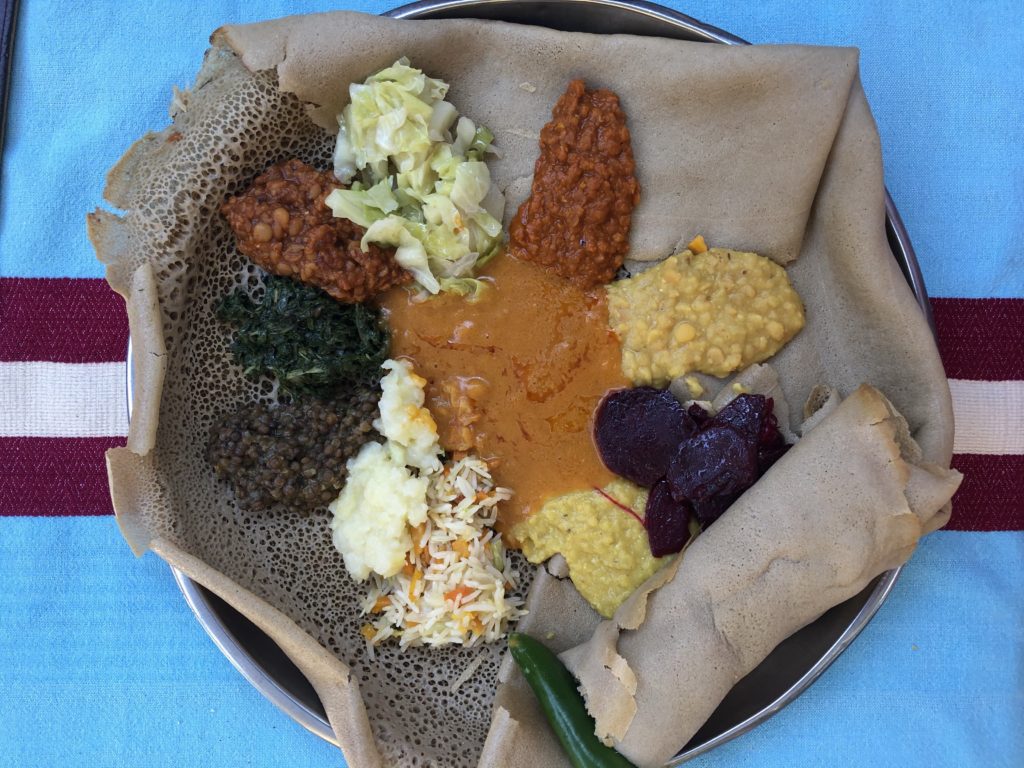
Food and Drink in Ethiopia
12. be sure to try the local cuisine.
One of my highlights from Ethiopia was the incredible food. Injera is a local speciality you absolutely must try and in all honesty, I couldn’t get enough off it! Honey is a specialty in the country so be sure to sample some local honey along your journey.
13. Many restaurants do not have menus
One thing we noticed early on was that many restaurants (especially the local ones not catered to tourists) do not have menus. Instead give a simple instruction to your server like “Injera” for chickpea flat bread or if you’re feeling really adventurous, just order “food for two” with a hand gesture for two people.
14. Vegetarians will find it easy in Ethiopia
I was pleasantly surprised to learn that Ethiopia is incredibly vegetarian friendly and you will almost always find options at restaurants. Opt for the “fasting” menu to land yourself a vegetarian feast, available every Wednesday and Friday especially.
15. Try coffee anywhere, everywhere!
If you didn’t know already, Ethiopia is the birthplace of coffee and thus one of the best places in the world to sample fresh local beans.
16. Drink bottled water or use a filtered water bottle
As is the case in much of Africa, tap water is not safe for drinking. You should always stick to bottled or filtered water. Over recent years I have become much more concerned with my plastic usage and the impact travel can have on the environment. If you are looking to reduce your impact, consider one of these filtered travel water bottles that makes any water in the world drinkable.
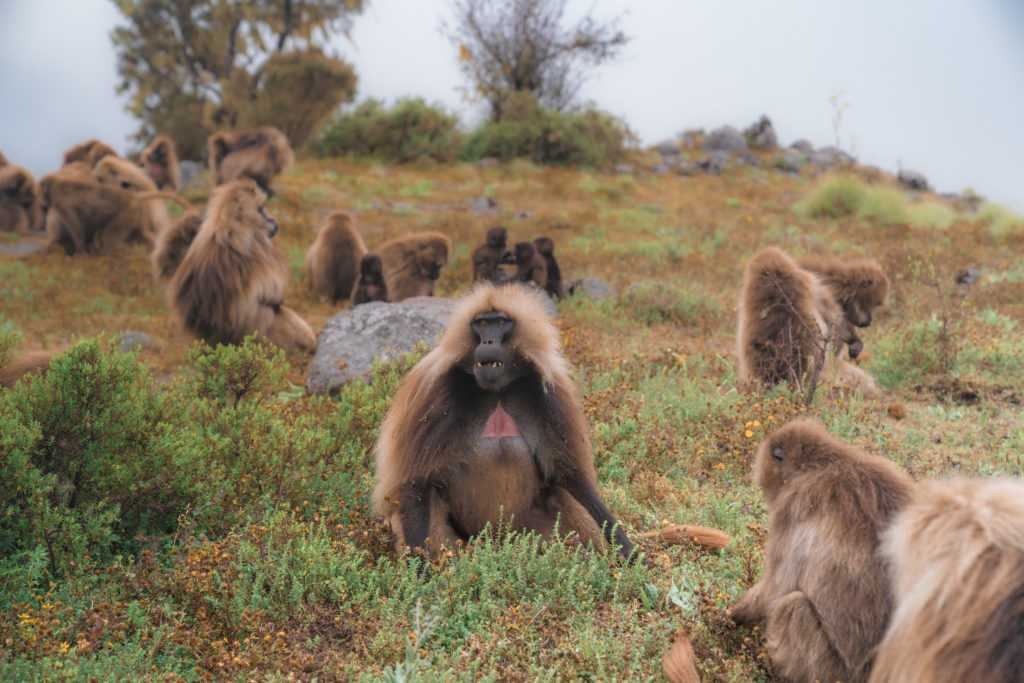
Health & Safety
17. for the most part, ethiopia is a safe country to travel in.
One of the biggest points I want to make and assure you of is that Ethiopia is safe and relatively stress free to travel throughout. This is however subject to change so before you visit Ethiopia it is important to check the political situation before you travel.
18. Vaccinate before you travel
Yellow fever is a mandatory vaccination to have before you visit Ethiopia as well as a handful of others travel vaccines (especially if you are travelling from a Western nation where we are not exposed to these diseases).
19. Protect yourself from Malaria
Before you visit Ethiopia you need to protect yourself from malaria as the risk very high. Despite my doctor’s advice, I chose against malaria tablets as they are expensive and must be taken for weeks after your visit. Instead I decided to use insect repellent, dress appropriately and avoid mosquitos as much as possible.
20. Don’t have high expectations for bathrooms, or sometimes bathrooms at all!
Finally… a note on bathrooms. I was not surprised at the state of toilets in Ethiopia as earlier this year I travelled to Pakistan and became quite accustomed to poor toilet offerings. The best option is to go in nature a lot of the time, especially when travelling to the Danakil Depression (this will be your only option). Take precautions and always travel with toilet paper and hand sanitiser!
All the best for safe and adventurous travels in Ethiopia! If you have any questions, please feel free to comment below.
Brooke Saward founded World of Wanderlust as a place to share inspiration from her travels and to inspire others to see our world. She now divides her time between adventures abroad and adventures in the kitchen, with a particular weakness for French pastries.
Find me on: Twitter | Instagram | Facebook
You may also enjoy:
The 20 best safari lodges in africa.
Los Angeles
Plan a trip
First trip solo
Packing guide
20 Best Places for Solo Female Travel
Travel after a break up
20 Places in your 20’s
WAYS TO TRAVEL
Solo travel
Adventure travel
Luxury travel
Learn a language
Become a blogger
- Travelling to Ethiopia
- Getting around
Things to Do
- The Great Ethiopian Run
- Where to Stay
- Health and Safety
- Find a Travel Agent
Discover Ethiopia
Ethiopia is an ancient country whose unique cultural heritage, rich history and remarkable biodiversity are reflected in a tally of nine UNESCO World Heritage Sites – more than any other country in Africa. Within its borders, you’ll find the world’s fourth-holiest Islamic city, along with the oldest continuously-occupied town south of the Sahara. Compelling antiquities include the medieval rock-hewn churches of Lalibela and Gheralta, palaces and temples dating back 3,000 years, the magnificent 17th century castles of Gondar, and the oldest human fossils unearthed anywhere on the planet. Add to this the beautiful Simien and Bale Mountains, the spectacular volcanic landscapes of the Danakil Depression, and a wealth of mammals and birds found nowhere else in the world, and it’s little wonder that Ethiopia has become the most attractive and popular emergent tourist destination in Africa.
Land of Origins
Ethiopia is the cradle of humanity , where we first walked on two legs.
…It is also the source of the Blue Nile , the great river whose power and fertility nurtured the origin of civilisation itself.
…And it is the origin of one of life’s greatest pleasures – coffee, Ethiopia’s gift to the world .
So come to Ethiopia and be enchanted by her extraordinary past and share in her dynamic present.
Come, and you will discover why Ethiopia is original in so many ways.
#VisitEthiopia
Testimonials, plan your trip.
Ethiopia’s national carrier, Ethiopian Airlines, is the fastest growing airline in Africa. In its seven decades of operation, Ethiopian has become one of the continent’s leading carriers, unrivalled in efficiency and operational success.
It also offers the continent’s most extensive flight network, with international routings connecting Addis Ababa to more than 90 cities outside Ethiopia, as well as 20 domestic destinations.
Ethiopian Airlines flies daily from Heathrow to Addis Ababa, providing connectivity to 54 destinations on the African continent and more than a total of 98 worldwide.
Your flight to Ethiopia is bookable online , by phone 0800 016 3449 or via travel agencies.
A complete list of airlines that fly to Addis Ababa are listed on the Ethiopian Tourism Organisation website .
All international flights arrive and depart from Bole International Airport on the outskirts of central Addis Ababa.

Ethiopian Airlines operates a daily “Historic Route Service” for tourists connecting Addis Ababa to the historic cities of the northern circuit i.e. Aksum, Bahir Dar, Gondar and Lalibela. Connecting flights also run daily between these northern cities.
There are also domestic flights to several other key centres including Arba Minch, Assosa, Dire Dawa, Gambella, Gondar, Jijiga, Jimma, Mekele and Semera.
An increasingly popular option with tourists is to travel overland with one of many reliable operators in Addis Ababa offering group tours and a range of bespoke 4×4 itineraries.
More remote parts of the country, such as the Danakil Depression and Erta Ale, or the tribal lands of South Omo, can only realistically be visited on an organised 4×4 expedition with a specialist local operator.
Come and take part in Africa’s biggest road race in Ethiopia’s capital Addis Ababa – it is an unforgettable experience.
Celebrated as one of the liveliest and most colourful races in the world, the Great Ethiopian Run is Ethiopia’s biggest street party, with over 40,000 Ethiopians and tourists running, walking and dancing their way along the route, led by Ethiopia’s celebrated international runners.
The hotel supply in Addis Ababa is growing quickly with an increasing number of properties offering international standards including several apartment hotels and branded hotels: Sheraton, Hilton, Radisson Blue, Golden Tulip, Marriott and Ramada. Smaller hotels and cozy guest-houses are also available.
In the main tourist destinations, there is a range of accommodation available including urban hotels as well as smaller properties with local charm and lodges in national parks and other unique locations.
Ethiopia is a safe and reasonably healthy country provided you take a few common-sense precautions. For more information visit the Ethiopian Tourism Organisation
Ensure your inoculations are up to date, mainly if you are traveling out of the capital or you will stay away from the largest hotels. We advise that you talk to your GP, practice nurse or travel health clinic about any immunisations you may need at least two months before travelling. For more information on immunisation, please visit the NHS Fit for Travel website or the TravelHealthPro website.
For the latest advice by country including safety and security, entry requirements, travel warnings and health, please visit the Foreign and Commonwealth Office
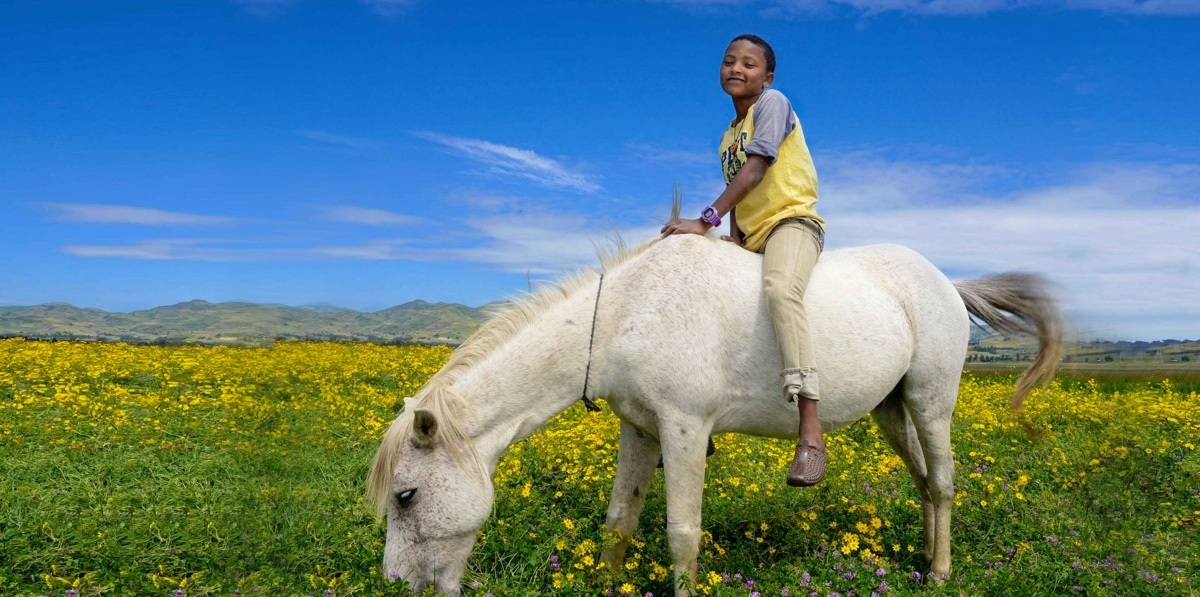
There are a number of tour operators worldwide offering a range of trips to Ethiopia encompassing cultural, adventure, trekking and birdwatching packages, among others.
Tour Operators in the UK
- Abercrombie & Kent
- Africa Odyssey
- Brilliant Ethiopia
- cazenove+loyd
- Cox and Kings
- Dragoman Overland Tours
- Ethio Cycling Holidays
- Far and Wild Travel
- Fitzroy Travel
- Gane & Marshall
- Journeys by Design
- Original Travel
- Rainbow Tours
- Real Africa
- Red Savannah
- Saddle Skedaddle Cycling Holidays
- Tadele Travel
- Tim Best Travel
- Tourdust Ltd.
- Travel the Unknown
- Voyages Jules Verne
- Wild Frontiers
- World Expeditions
Tour Operators in Ethiopia
Incoming tour operators in Ethiopia offer a variety of trips covering the main tourism destinations as well as the lesser known and more remote areas of the country. They can operate road and air circuits, and can put together special interest tours, bespoke luxury tours, air charters and helicopter tours.
There are two associations of incoming tour operators:
- Ethiopian Tour Operators Association (ETOA)
- Society of Tour Operators in Addis Ababa (STOA)
Members of these organisations provide services countrywide.
Apply for Tourist Visa
All visitors to Ethiopia, with the exception of nationals from Djibouti and Kenya, are required to apply for a visa. An increasing number of nationals can also get a visa online or on arrival at the airport. Please check before you travel.
Request Tourist Information
No. A certificate of vaccination for yellow fever is no longer mandatory.
The Ethiopian currency is Birr. Changing money is straightforward in cities and bigger towns.
Although credit cards are accepted in large hotels and lodges, restaurants and shops, you might need cash for smaller establishments and on the roads less travelled.
Ethiopia’s official language is Amharic. English is widely spoken but a few words of Amharic can make you new friends.
If you are bringing professional photographic or video equipment, check with your tour operator or local contact before you travel as special customs regulations may apply. You may also contact the Press Office for further information and advice.
Related News

IMAGES
VIDEO
COMMENTS
The thick warm air, the hazy sky and the rugged empty mountains that gradually give way to the immensity of a white, shimmering salt desert all leave the traveller in awe of this cruel yet fascinating landscape. Overlapping the Afar region of northeastern Ethiopia, Eritrea and Djibouti, this is the lowest point in Africa and one of the hottest ...
Learn how to get a visa, when to visit, what to see and do, and more in this comprehensive Ethiopia travel guide. Discover the cultural, historical and natural diversity of this African country, from ancient churches to volcanic lakes.
Discover Ethiopia's rich history, culture and wildlife with Lonely Planet's expert advice and recommendations. Find out the best attractions, activities, articles and guidebooks for your trip to this unique African country.
1. Simien Mountains National Park. 1,591. National Parks. Simien Mountains National Park, in northern Ethiopia is a spectacular landscape, where massive erosion over millions of years has created jagged mountain peaks, deep valleys and sharp precipices dropping some 1,500 m. The park is of global significance for biodiversity conservation ...
The best time to visit Ethiopia is between October and March. The country experiences a rainy season from June to September, although travelling during these months is still possible. We've written an entire guide on when to visit Ethiopia . When to visit Ethiopia. A short walk takes you to the top of the falls.
Please visit the Embassy's COVID-19 page more information on entry/ exit requirements related to COVID-19 in Ethiopia.. Requirements for Entry: Passport; Visa; World Health Organization (WHO) card with yellow fever vaccination if coming from country with risk of yellow fever transmission (countries with risk of YF transmission)Visas: All U.S. citizens are required to obtain a visa to legally ...
Egypt. Discover the best attractions in Ethiopia including Bet Giyorgis, Abuna Yemata Guh, and Simien Mountains National Park.
Accommodations in Ethiopia. A clean and basic double room in Addis starts around 450 Birr ($20) up to 800 Birr ($36). Outside of Addis, rooms are considerably cheaper. Basic hotels include Wi-Fi and hot water, and cost around 300 Birr ($13) for a double room.
About Ethiopia. Ethiopia is an ancient country whose unique cultural heritage, rich history, and remarkable biodiversity are reflected in a tally of nine UNESCO World Heritage Sites - more than any other country in Africa. Within its borders, you'll find the world's fourth-holiest Islamic city, along with the oldest continuously occupied ...
On 27 September (a day later in leap years), Ethiopia erupts into festival mode to celebrate Meskel, which commemorates the finding of the True Cross more than 1600 years ago. Arguably the optimum time to visit Ethiopia is from mid October to January, when the rains are over but the countryside is still quite green.
Mekele. Founded by Emperor Yohannes IV in 1881, Mekele is the main and most modern city in the Northern region of Ethiopia and tourism infrastructure is better than in other parts of the country. Set in a basin at 2,200m in the rocky Tigraian Highlands, the city is clean, organised and vibrant.
15. Try coffee anywhere, everywhere! If you didn't know already, Ethiopia is the birthplace of coffee and thus one of the best places in the world to sample fresh local beans. 16. Drink bottled water or use a filtered water bottle. As is the case in much of Africa, tap water is not safe for drinking.
Let's explore the best places to visit in Ethiopia: 1. Danakil Depression. Source: flickr. Danakil Depression. Positioned on the border between Ethiopia and Eritrea is the Danakil Depression. It's officially one of driest and hottest places on Earth. With temperatures that often reach 50+ degrees, it's easy to see why.
Your flight to Ethiopia is bookable online, by phone 0800 016 3449 or via travel agencies. A complete list of airlines that fly to Addis Ababa are listed on the Ethiopian Tourism Organisation website. All international flights arrive and depart from Bole International Airport on the outskirts of central Addis Ababa.
Day 1, 2, 3 - Addis Ababa. Whether you fly to Ethiopia from overseas or from nearby Kenya, your first stop will be Addis Ababa, the capital. Take a few days here to spend some time relaxing and exploring the local sights. You can enjoy a visit to some of the ancient churches like Holy Trinity or Medhane Alem.
The Weather in Ethiopia . Although Ethiopia's climate varies greatly depending on the region you're planning on visiting, the wet season generally lasts from June to September, with light rains beginning as early as March. June and July are the wettest months, particularly in the Northern Highlands. Weatherwise, therefore, the best time to travel is from October to February, when the ...
FCDO advises against all travel within: 20km of the border with Sudan. 10km of the border with South Sudan. 100km of the Ethiopian border with Somalia and Kenya in Ethiopia's Somali region, and ...
119 Ethiopia Tours. Best Time October to December (Beautiful scenery, little rain) High Season October to January (Main historical sites and some parks get busy) Low Season May to September (Few travelers and low-season rates) Best Weather October to April (Little rainfall, sunny days) Worst Weather July to August (Wettest months)
Tourism Ethiopia has adopted the international travel protocol introduced by the World Travel and Tourism Council (WTTC) that promotes safe travel during the COVID-19 pandemic. The international safety standard help to minimize the risk of exposure to infection. The protocol promotes the wellbeing of tourists during travel starting from the ...
For the. Explorer. Ethiopia is filled with an abundance of unique animals, beautiful landscapes and incredible resorts. More than 70% of Africa's mountains are found in Ethiopia! It has something for everyone to explore across it's vast areas of green lands. You can find places to relax or places to go on an adventure.
Visit Ethiopia - A Country of Endless Surprises. November 14, 2023. Posted on December 8, 2023. Lephis Ecotourism Village: Explore nature, culture, and sustainability in Ethiopia's hidden gem. Plan your visit….
Ethiopian Airlines' transit program gives customers flying via Addis Ababa a free hotel, transit visa, and transfers during layovers lasting between eight and 24 hours. Advertisement
Get your visa. All visitors to Ethiopia require visas. The only exceptions are nationals from Djibouti and Kenya and travelers who arrive at Addis Ababa Bole International Airport to catch a connecting flight. Ethiopian Visa can be collected at Ethiopian Embassies and consulates abroad or on Arrival. Right now visa can be obtained with an ...
By Sola Ogundipe. Save the Children and GlaxoSmithKline, GSK, have joined forces to launch a new $1 million initiative aimed at accelerating childhood vaccination rates in Nigeria and Ethiopia.
A woman stands against a house marked by conflict in Wukro, Ethiopia. Amnesty exposed how Facebook's algorithms fuelled violence in Tigray. Photograph: Eduardo Soteras/AFP/Getty
Round 1 Connect to your Multi-Cultural Roots. Time frame: End of December 2023 to Beginning of February 2024 The first round of the program is destined to enable second generation Ethiopians to experience and get reconnected to the diverse cultures, traditions, customs and features that make Ethiopians unique, and establish social and psychological ties that would help strengthen their role as ...